18 Best Sales Automation Tools 2025: Complete Guide for Revenue Growth
How top sales automation tools for 2025 increase efficiency, accelerate deal closure, and maximize revenue growth
Blogby JanAugust 03, 2025

Sales teams using modern sales automation tools achieve 61% higher revenue targets while reducing manual work by 67%. Yet most organizations still rely on fragmented solutions that create data silos, workflow gaps, and productivity bottlenecks that limit growth potential.
The best sales automation tools 2025 combine artificial intelligence, workflow automation, and intelligent data processing to eliminate repetitive tasks while enhancing sales effectiveness. Organizations implementing comprehensive automation strategies report 45% faster deal closure and 58% improvement in lead qualification accuracy.
Recent analysis shows that companies investing in sales automation technology experience 3.1x faster revenue growth and 2.5x higher customer acquisition rates than competitors using traditional sales methods. The most successful implementations focus on automating time-consuming activities while preserving human connection and relationship building capabilities.
This comprehensive guide examines 18 top-performing sales automation tools that deliver measurable results for modern sales organizations. From AI-powered research platforms to intelligent conversation analysis, these tools represent the most effective solutions for accelerating sales performance and achieving sustainable revenue growth.
Why Sales Teams Need Automation Tools in 2025
Contemporary sales environments demand efficiency levels that manual processes cannot achieve. Modern buyers complete extensive research before engaging with sales representatives, requiring sales teams to identify prospects earlier, engage with relevant messaging, and maintain consistent follow-up across multiple touchpoints simultaneously.
Sales automation tools address critical productivity challenges that prevent teams from reaching their potential. First, time allocation optimization - manual research, data entry, and administrative tasks consume 64% of sales professionals' time, leaving minimal opportunity for actual selling activities that drive revenue generation.
Second, consistency and scale - human-driven processes create variability in outreach timing, messaging quality, and follow-up frequency that impacts conversion rates. Automation ensures consistent execution of proven sales sequences while enabling simultaneous engagement with hundreds of prospects.
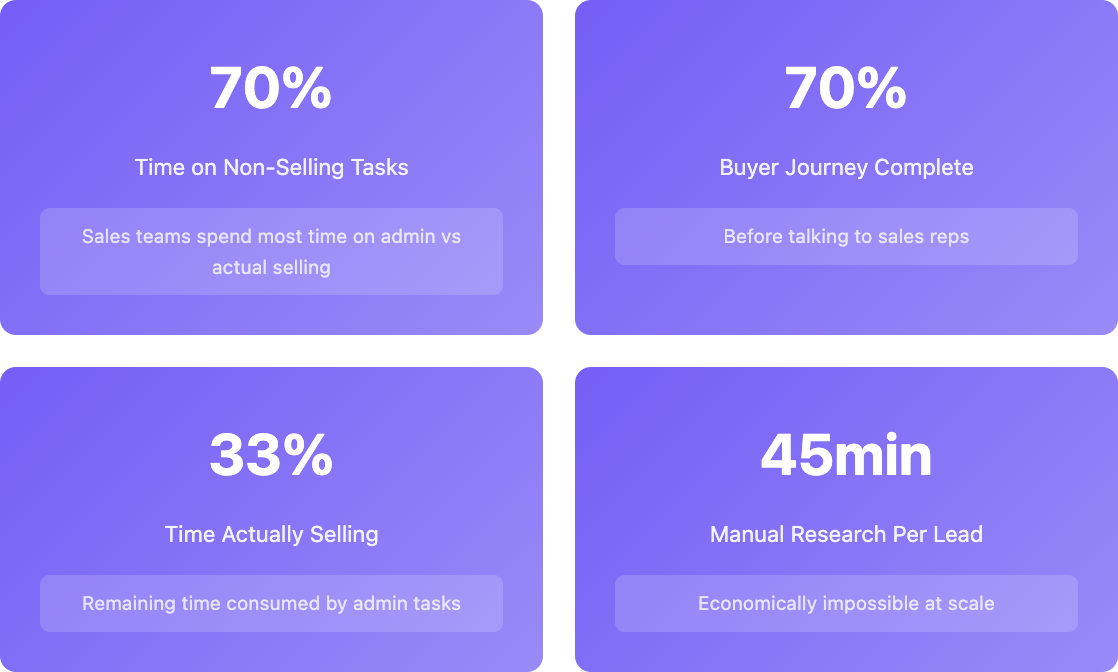
Third, data intelligence and personalization - modern sales requires comprehensive prospect research, competitive intelligence, and behavioral insights that manual methods cannot provide efficiently. Advanced automation tools analyze vast data sets to identify optimal engagement opportunities and generate personalized messaging at scale.
Fourth, performance measurement and optimization - successful sales organizations require detailed analytics on activity effectiveness, conversion patterns, and team performance trends. Automation platforms provide comprehensive tracking and analysis capabilities that enable continuous improvement and strategic decision-making.
Types of Sales Automation Tools Explained
Understanding different categories of sales automation tools helps organizations select solutions that align with specific sales processes and business objectives.
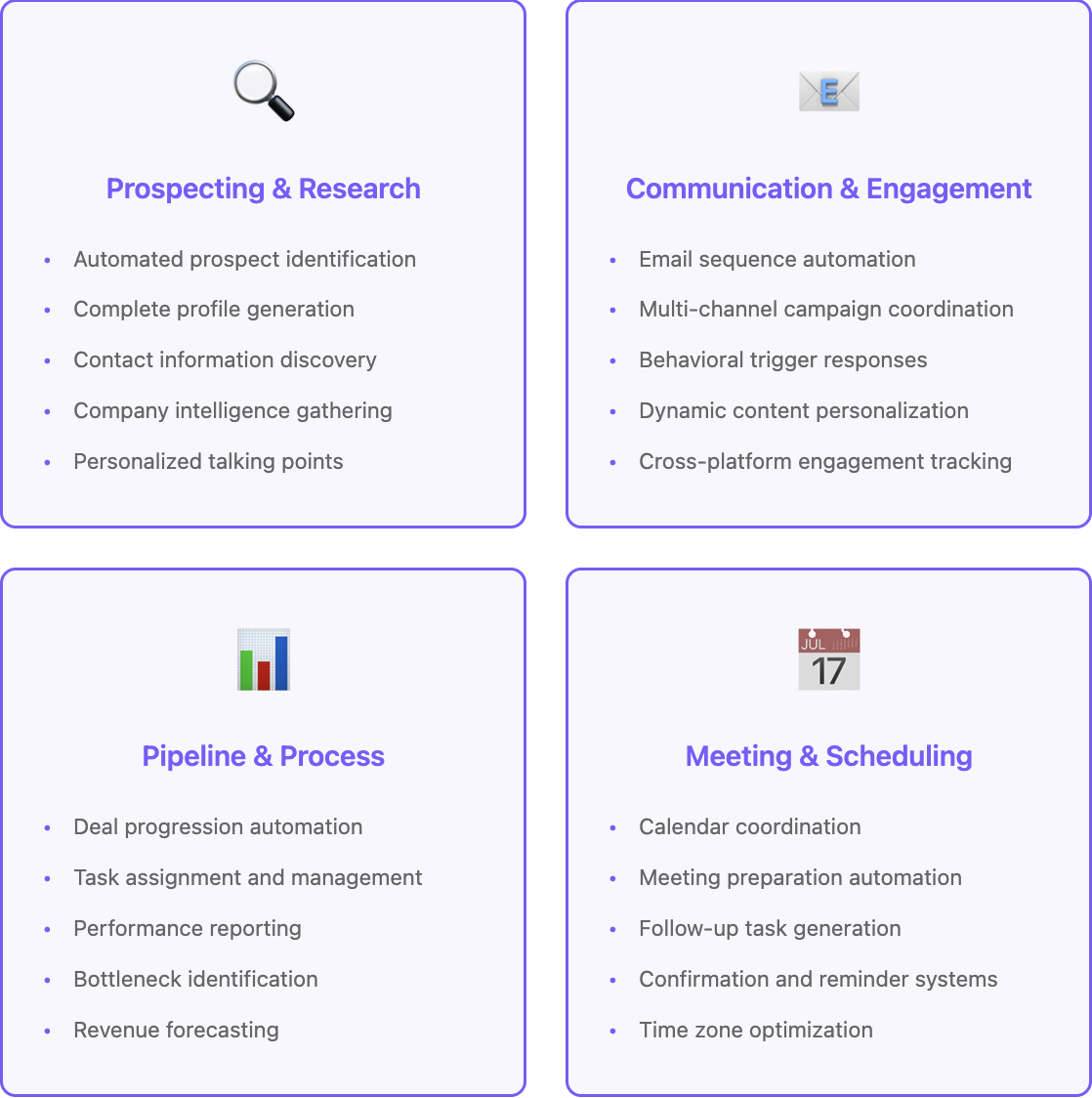
Data Intelligence Platforms
Data intelligence platforms like Databar.ai automate prospect research and contact discovery processes. These tools excel for outbound sales strategies where comprehensive prospect intelligence drives successful conversations. Key capabilities include automated data enrichment, contact verification, and competitive analysis that would require hours of manual research.
CRM Automation Systems
Customer relationship management automation platforms such as Salesforce and HubSpot coordinate prospect tracking, opportunity management, and customer communication workflows. These systems work best for organizations requiring structured sales processes with detailed activity tracking and performance measurement capabilities.
Email Sequence Tools
Email automation platforms including Instantly and Lemlist optimize outbound communication through automated sequencing, personalization, and response tracking. These tools excel for high-volume prospecting strategies where consistent messaging and timing drive engagement and conversion rates.
Meeting Scheduling Software
Scheduling automation tools like Calendly and Chili Piper eliminate back-and-forth coordination while optimizing calendar management and meeting preparation workflows. These platforms work particularly well for businesses with high meeting volumes and complex scheduling requirements across multiple team members.
18 Best Sales Automation Tools for 2025
1. Databar.ai
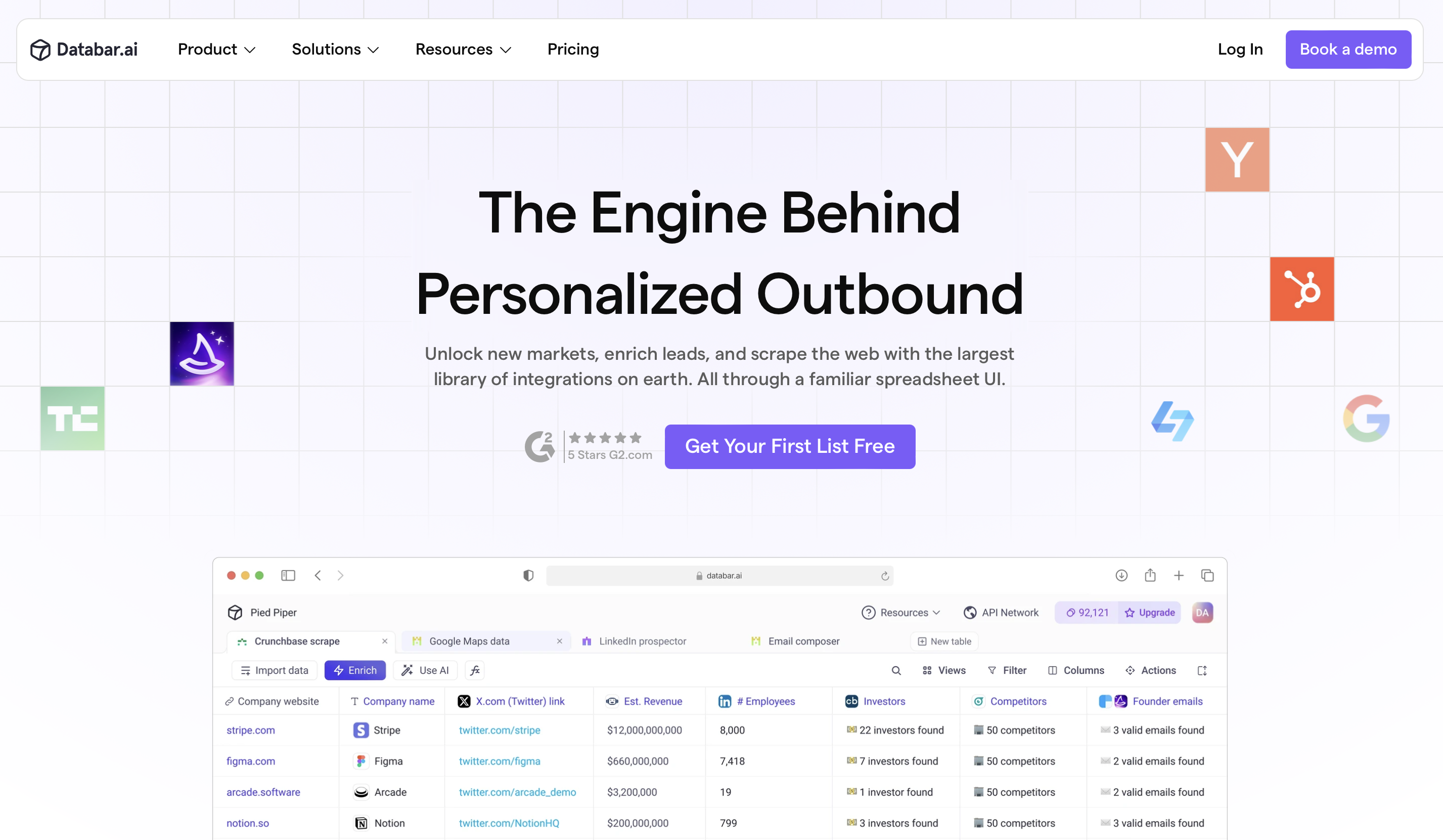
Databar.ai leads the sales automation tools category through AI-powered research and multi-source data intelligence capabilities. Unlike traditional platforms that focus on single functions, Databar.ai automates the entire prospect research workflow from initial identification through personalized outreach preparation.
The platform's innovative approach combines access to 90+ specialized data providers with artificial intelligence analysis to create complete prospect profiles automatically. When sales teams identify target companies or individuals, Databar.ai enriches that information with contact details, funding insights, technology stack analysis, and competitive intelligence without manual research requirements.
What distinguishes Databar.ai from other sales automation tools is its unified approach to sales intelligence. While traditional platforms require multiple subscriptions and complex integrations to achieve comprehensive automation, Databar.ai delivers complete prospect research, data enrichment, and personalized outreach preparation within a single platform. This consolidation eliminates the productivity losses and data inconsistencies that plague multi-tool automation strategies.
Advanced automation capabilities include web scraping that extracts specific information based on custom queries and AI-generated personalized messaging that references prospect activity and company news.
Organizations implementing Databar.ai typically report 70% reduction in prospect research time, higher email response rates due to enhanced personalization, and 80%+ contact discovery success rates through waterfall enrichment technology that checks multiple data sources sequentially.
The platform's unique value lies in combining comprehensive data access with intelligent automation, eliminating the need for multiple tool subscriptions while delivering superior research capabilities that would require dedicated research teams to achieve manually.
Pricing: Starting at $39/month with transparent usage-based scaling that accommodates team growth and expanding prospect volumes.
> Start your free Databar trial here >
2. Salesforce
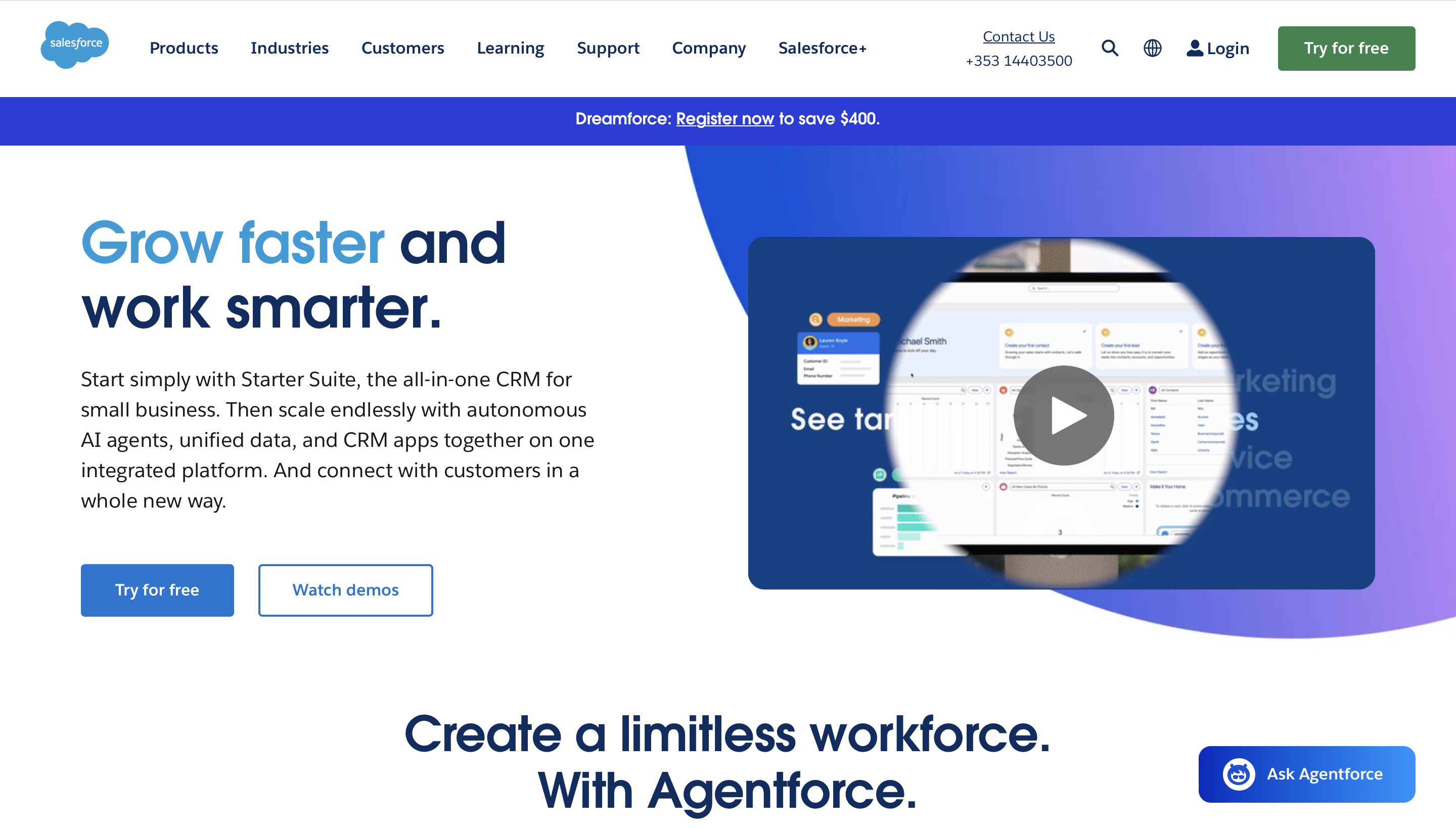
Salesforce provides comprehensive sales automation capabilities through its enterprise-grade customer relationship management platform. The solution automates complex sales processes including lead scoring, opportunity tracking, and territory management while providing detailed analytics and forecasting capabilities.
Salesforce's automation features include workflow rules that trigger specific actions based on prospect behavior, automated lead assignment based on territory and expertise criteria, and Einstein AI capabilities that provide predictive insights and recommended actions. Advanced reporting automation generates performance dashboards and revenue forecasts automatically.
Integration capabilities connect Salesforce with hundreds of sales and marketing tools, enabling sophisticated automation workflows that span multiple platforms. Custom object creation and process builder functionality accommodate unique business requirements and industry-specific sales processes.
The platform excels for large sales organizations requiring structured processes, detailed compliance tracking, and comprehensive performance measurement. Salesforce's extensive customization options support complex automation scenarios while maintaining data integrity and audit capabilities.
Pricing: Essentials at $25/user/month; Professional at $75/user/month; Enterprise at $150/user/month; Unlimited at $300/user/month.
3. HubSpot Sales Hub
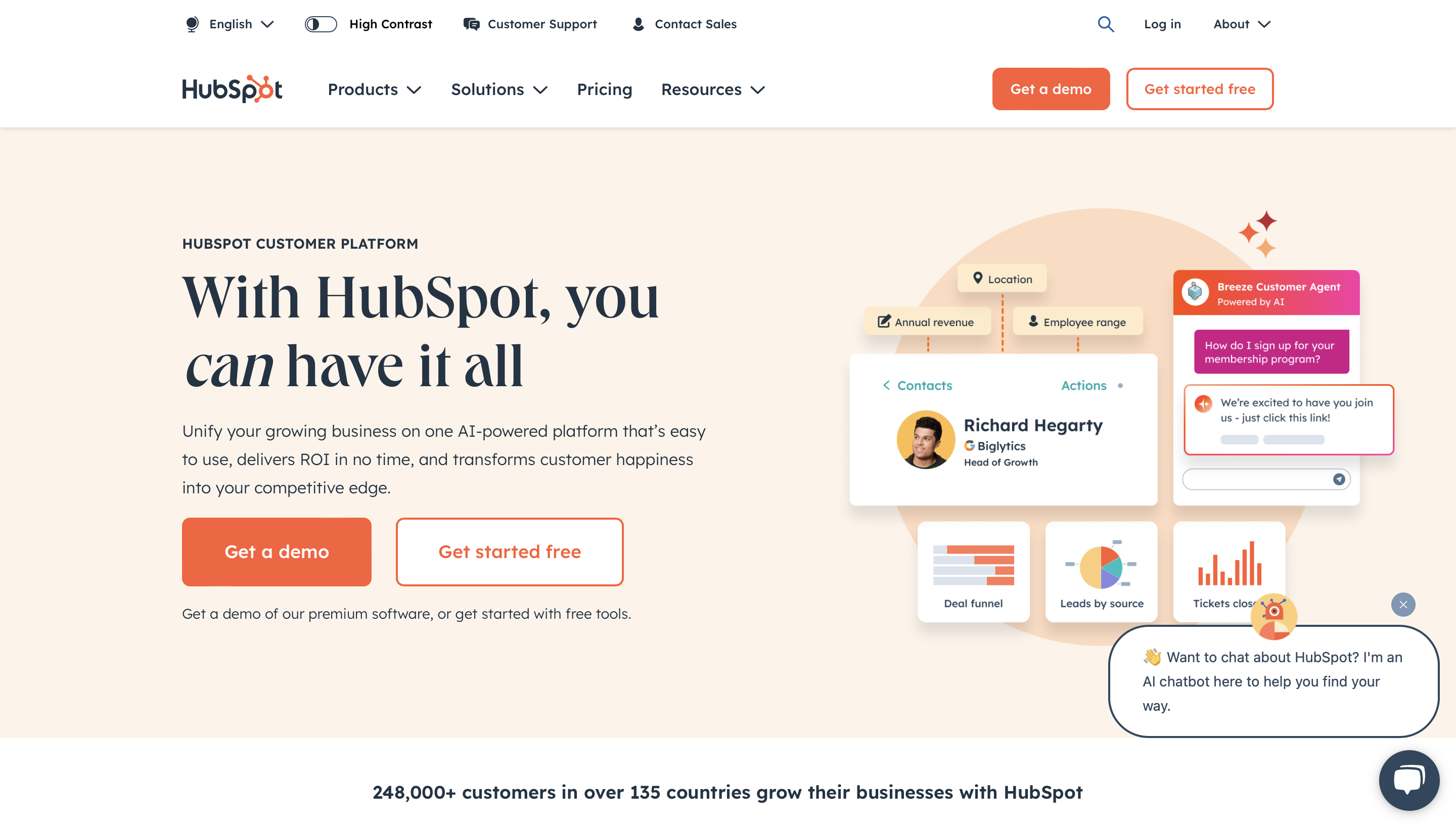
HubSpot Sales Hub delivers integrated sales automation tools that connect marketing activities with sales processes through unified data tracking and workflow automation. The platform excels for inbound sales strategies where content marketing and lead nurturing drive qualified prospect generation.
HubSpot's automation capabilities include email sequence creation, task automation based on prospect behavior, and lead scoring algorithms that prioritize prospects based on engagement patterns. Meeting scheduling integration eliminates coordination friction while automated follow-up ensures consistent prospect engagement.
The platform's strength lies in connecting marketing automation with sales activities through comprehensive tracking and attribution modeling. Lead lifecycle automation moves prospects through defined stages while triggering appropriate sales actions and content delivery based on behavioral triggers.
HubSpot works particularly well for businesses with strong content marketing strategies and longer sales cycles requiring extensive prospect education. The integrated approach eliminates data silos while providing comprehensive visibility into prospect journeys from initial awareness through customer conversion.
Pricing: Free CRM available; Sales Hub Starter at $45/month; Professional at $450/month; Enterprise at $1,200/month.
4. Outreach
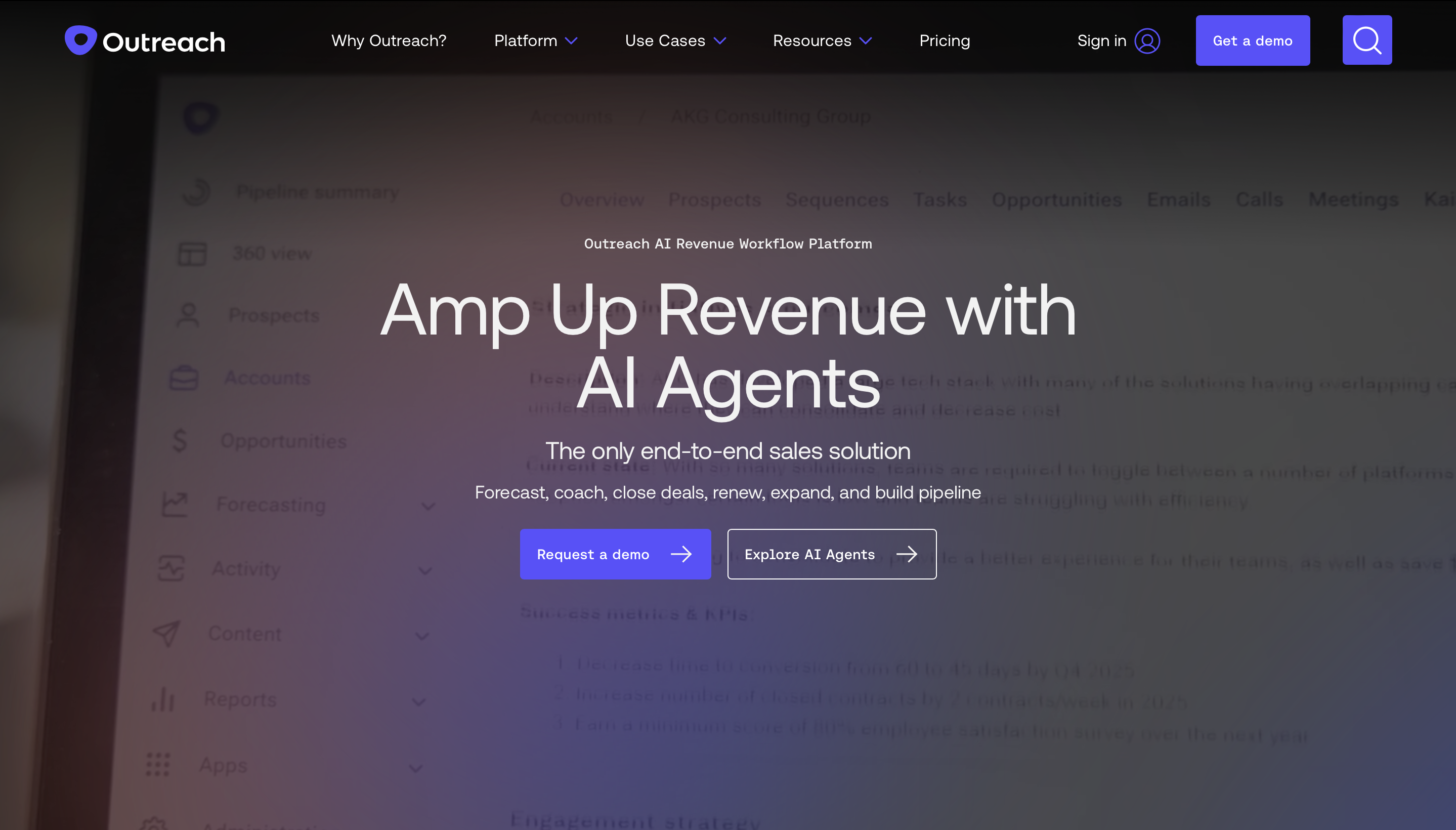
Outreach specializes in automated sales engagement through sophisticated multi-touch sequencing and performance optimization. The platform automates email campaigns, call scheduling, and task management while providing detailed analytics on engagement effectiveness and conversion patterns.
Outreach's sequence builder creates complex campaigns that combine emails, phone calls, social media touches, and manual tasks with conditional logic based on prospect responses. AI-powered optimization suggests timing improvements, messaging adjustments, and channel selection based on historical performance data.
Advanced analytics track engagement rates, response patterns, and conversion metrics across different prospect segments and messaging approaches. Conversation intelligence features analyze sales calls and provide coaching recommendations for improved outcomes and higher close rates.
The platform works exceptionally well for teams with high-volume outbound requirements and complex sales cycles requiring multiple touchpoints. Outreach's automation capabilities enable consistent prospect engagement while freeing sales professionals for relationship building and deal closing activities.
Pricing: Custom enterprise pricing based on team size, feature requirements, and integration specifications.
5. ZoomInfo
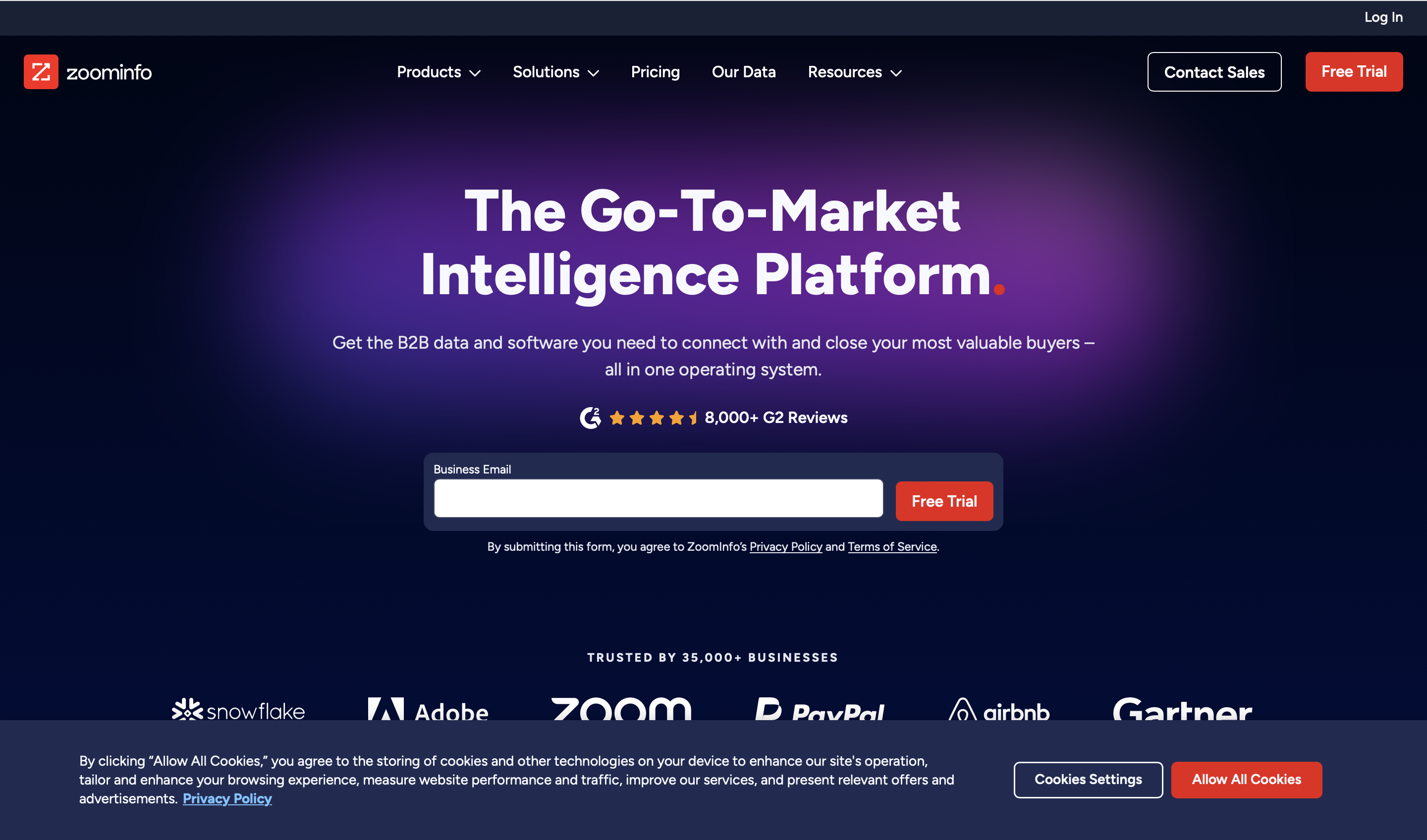
ZoomInfo automates prospect identification and contact discovery through its comprehensive B2B database and intelligence platform. The solution provides automated access to millions of verified business contacts alongside company insights and intent data for targeted outreach campaigns.
ZoomInfo's automation features include saved search alerts that notify users when new prospects match specific criteria, automated list building based on ideal customer profiles, and CRM integration that synchronizes contact information and company updates automatically.
Intent data capabilities identify prospects actively researching solutions within specific categories, enabling automated outreach when buying interest peaks. Organizational chart mapping reveals decision-making hierarchies and influences for strategic account planning and multi-threading approaches.
The platform excels for enterprise sales teams requiring high-volume prospecting with comprehensive prospect intelligence. ZoomInfo's accuracy standards and global coverage make it particularly valuable for organizations targeting multiple markets and industry verticals simultaneously.
Pricing: Custom enterprise pricing based on database access requirements, user count, and feature selection.
6. Pipedrive
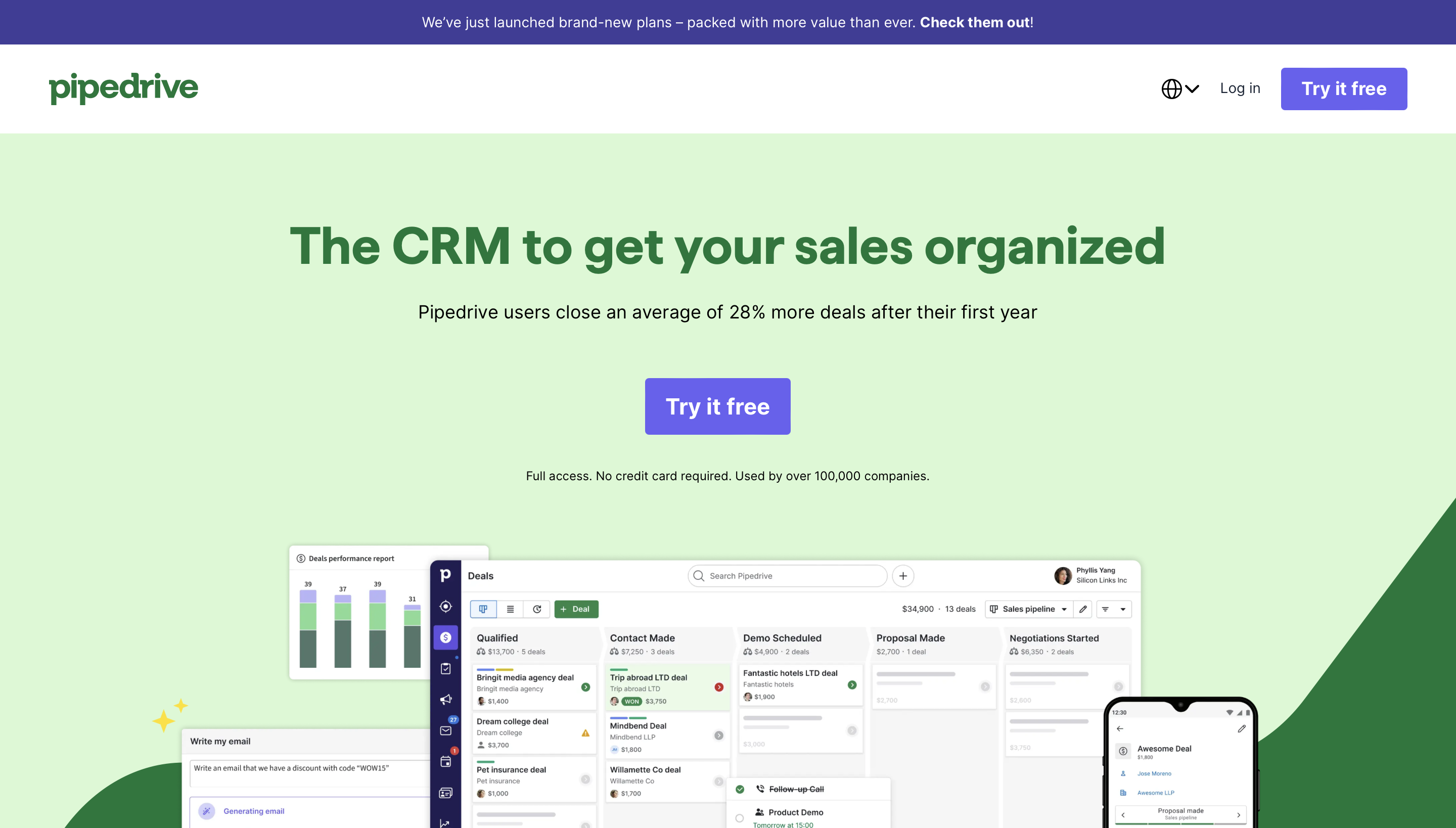
Pipedrive combines CRM functionality with sales automation features through visual pipeline management and workflow automation. The platform automates routine sales tasks while providing clear visibility into deal progression and team performance metrics.
Pipedrive's automation capabilities include activity reminders, deal progression notifications, and automated follow-up sequences based on prospect interactions. Smart contact data automatically enriches prospect profiles with publicly available information while integration capabilities connect with popular sales and marketing tools.
Visual pipeline management provides intuitive deal tracking with customizable stages and automated progression rules. Sales reporting automation generates performance dashboards and conversion analytics that identify successful approaches and optimization opportunities.
The platform works well for small to medium businesses requiring straightforward automation without complex configuration requirements. Pipedrive's simplicity encourages adoption while providing essential automation capabilities that improve consistency and efficiency.
Pricing: Essential at $14.90/user/month; Advanced at $27.90/user/month; Professional at $49.90/user/month; Power at $64.90/user/month; Enterprise at $99/user/month.
7. Apollo.io
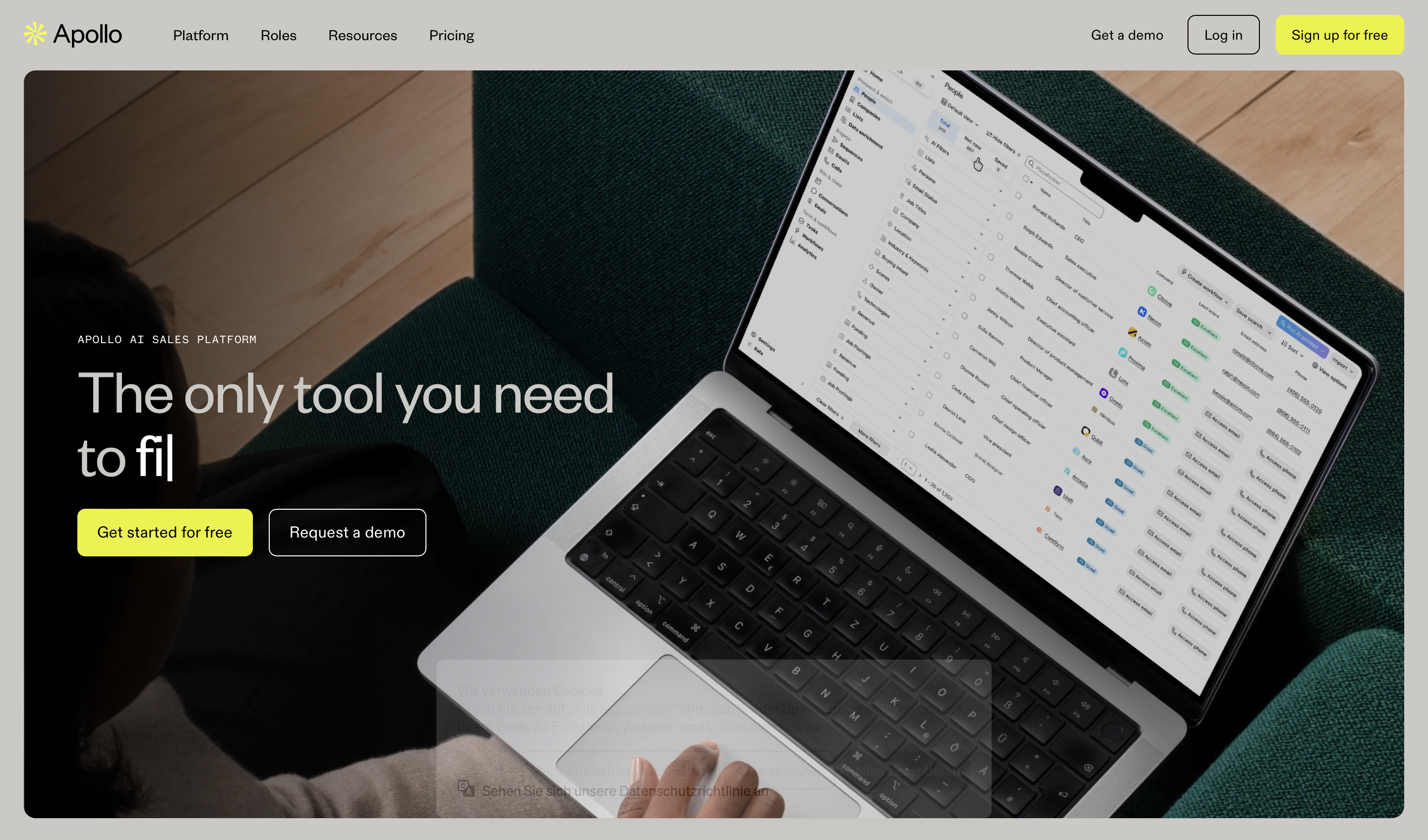
Apollo.io combines contact database access with sales automation capabilities in a unified platform that eliminates tool switching and data transfer requirements. The solution provides prospect research, email automation, and performance analytics within a single interface.
Apollo's automation features include email sequence creation, response tracking, and lead scoring based on engagement patterns. Contact enrichment capabilities automatically update prospect information while email verification ensures high deliverability rates for outbound campaigns.
The platform's integrated approach combines prospecting, outreach, and analysis capabilities that traditionally require multiple tools. Chrome extension functionality enables seamless research workflows while CRM integration maintains consistent data synchronization across sales processes.
Apollo works well for sales teams requiring comprehensive functionality without managing multiple tool subscriptions. The unified approach reduces complexity while maintaining professional-grade capabilities for prospect identification, engagement, and conversion tracking.
Pricing: Free plan available; paid plans start at $49/user/month with advanced features and higher usage limits.
8. Calendly
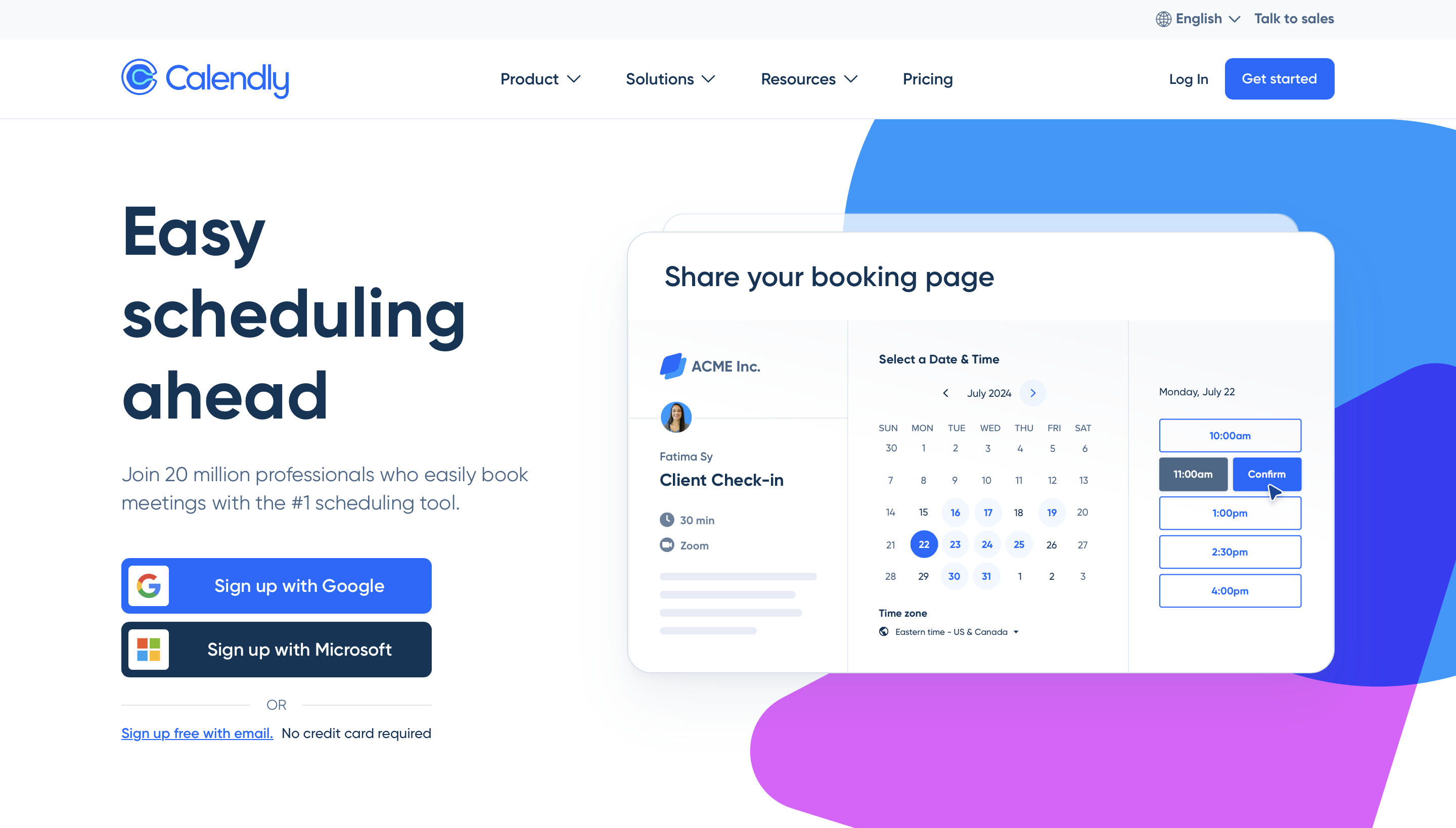
Calendly automates meeting coordination and calendar management while eliminating scheduling friction that slows sales processes. The platform provides sophisticated availability management, automated reminders, and integration capabilities that optimize meeting workflows.
Calendly's automation features include buffer time management, meeting type customization, and automated confirmation sequences that reduce no-shows. Integration capabilities connect with popular CRM and sales engagement platforms for seamless workflow coordination and activity tracking.
Advanced features include team scheduling coordination, round-robin assignment for lead distribution, and custom qualifying questions that pre-qualify prospects before meetings. Analytics track scheduling patterns and meeting outcomes for optimization opportunities.
The platform excels for businesses with high meeting volumes where scheduling coordination consumes significant administrative time. Calendly's automation eliminates back-and-forth communication while ensuring optimal calendar utilization and meeting preparation.
Pricing: Free plan available; paid plans start at $8/user/month with advanced features and team coordination capabilities.
9. Lemlist
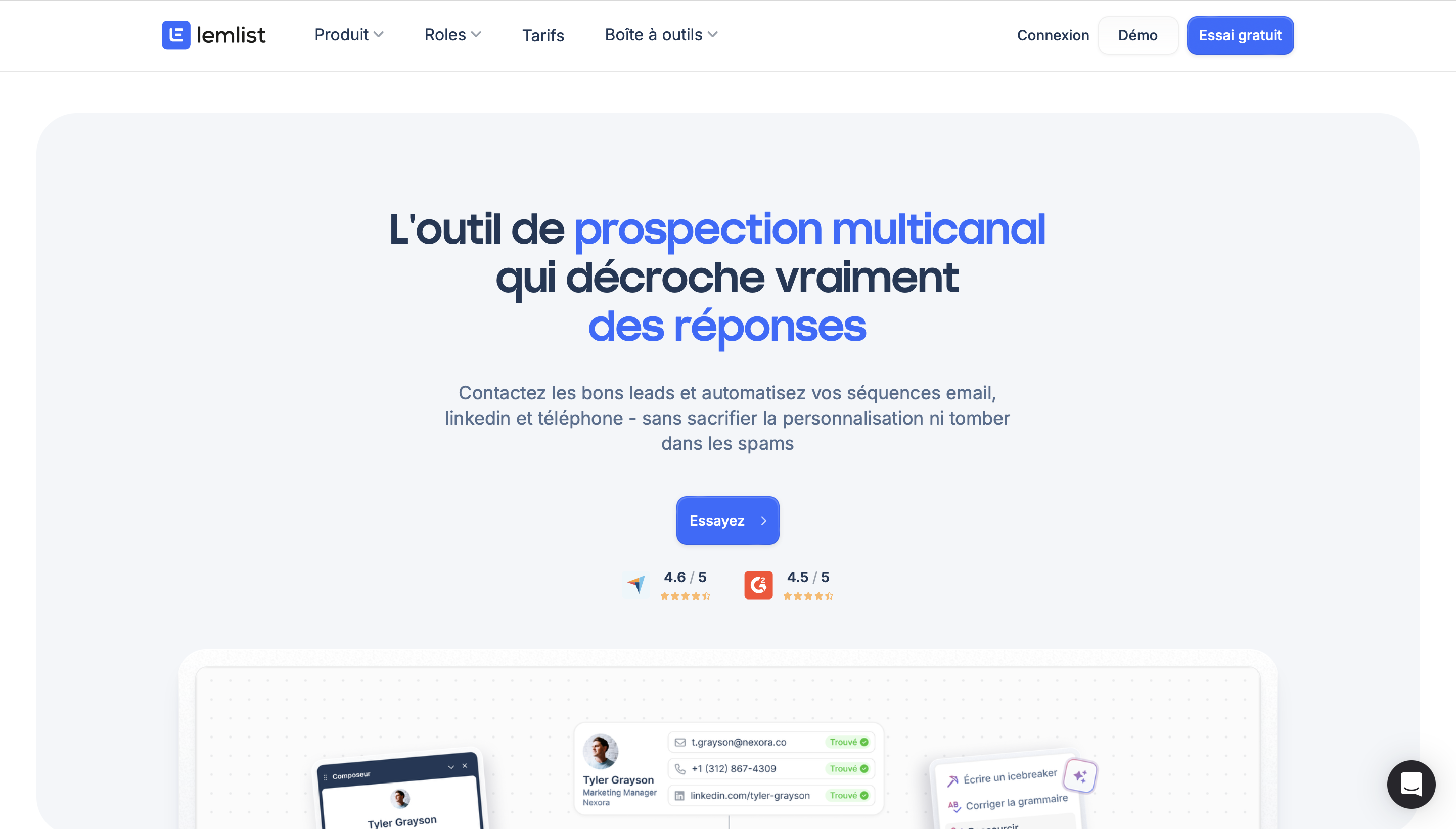
Lemlist focuses on personalized email automation with emphasis on creative customization and deliverability optimization. The platform automates cold outreach while maintaining individual personalization that increases engagement rates and response probability.
Lemlist's unique automation capabilities include dynamic image personalization, automated video creation, and custom landing page generation for each prospect. Email warm-up features improve sender reputation and inbox placement while A/B testing optimizes subject lines and messaging approaches.
Multi-channel sequencing combines email, LinkedIn, and phone outreach within unified campaigns for comprehensive prospect engagement. Advanced personalization options enable creative approaches that differentiate outreach from standard automated campaigns.
The platform works well for creative sales teams willing to invest time in personalization for higher engagement rates. Lemlist's focus on unique outreach approaches helps sales professionals stand out while maintaining automation efficiency.
Pricing: Email Outreach plan at $59/user/month; Sales Engagement at $99/user/month; Lemwarm add-on at $29/month.
10. Reply.io
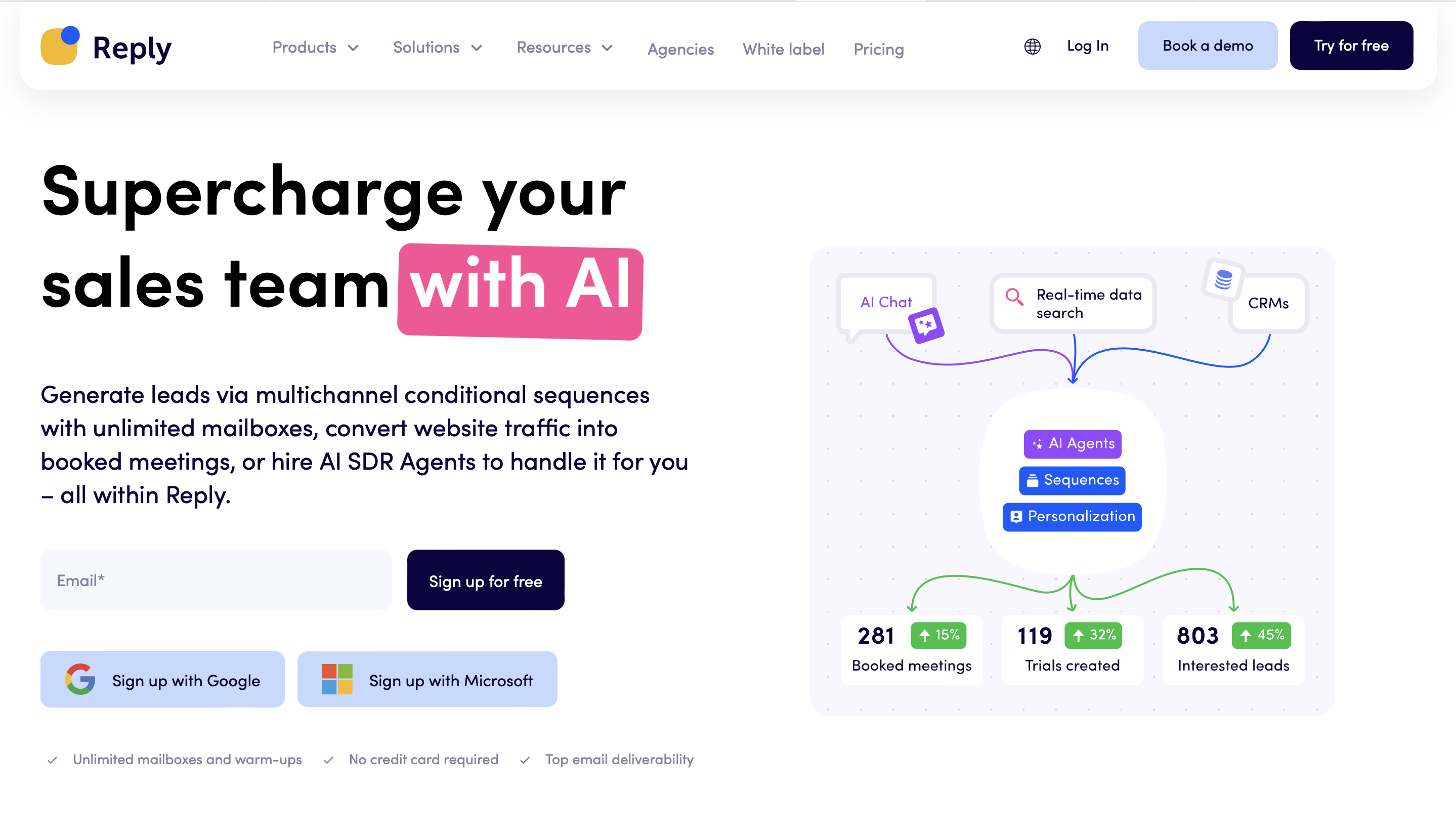
Reply.io automates multi-channel sales engagement through email, LinkedIn, phone, and SMS coordination within unified sequences. The platform optimizes outreach timing and channel selection while maintaining personalization across all communication methods.
Reply's automation features include sequence building with conditional logic, behavioral triggers, and multi-channel coordination. AI optimization suggests improvements for messaging, timing, and channel selection based on prospect engagement patterns and historical performance data.
Advanced analytics track performance across channels and provide insights for campaign optimization and strategy refinement. Lead management capabilities organize prospects and track engagement throughout complex outreach campaigns for coordinated follow-up efforts.
The platform works well for sales teams adopting comprehensive outreach strategies where multiple touchpoints increase engagement probability. Reply's multi-channel approach helps break through prospect noise while maintaining automated efficiency.
Pricing: Email plan at $60/user/month; Multichannel at $90/user/month; Agency plans available for larger teams.
11. Instanly
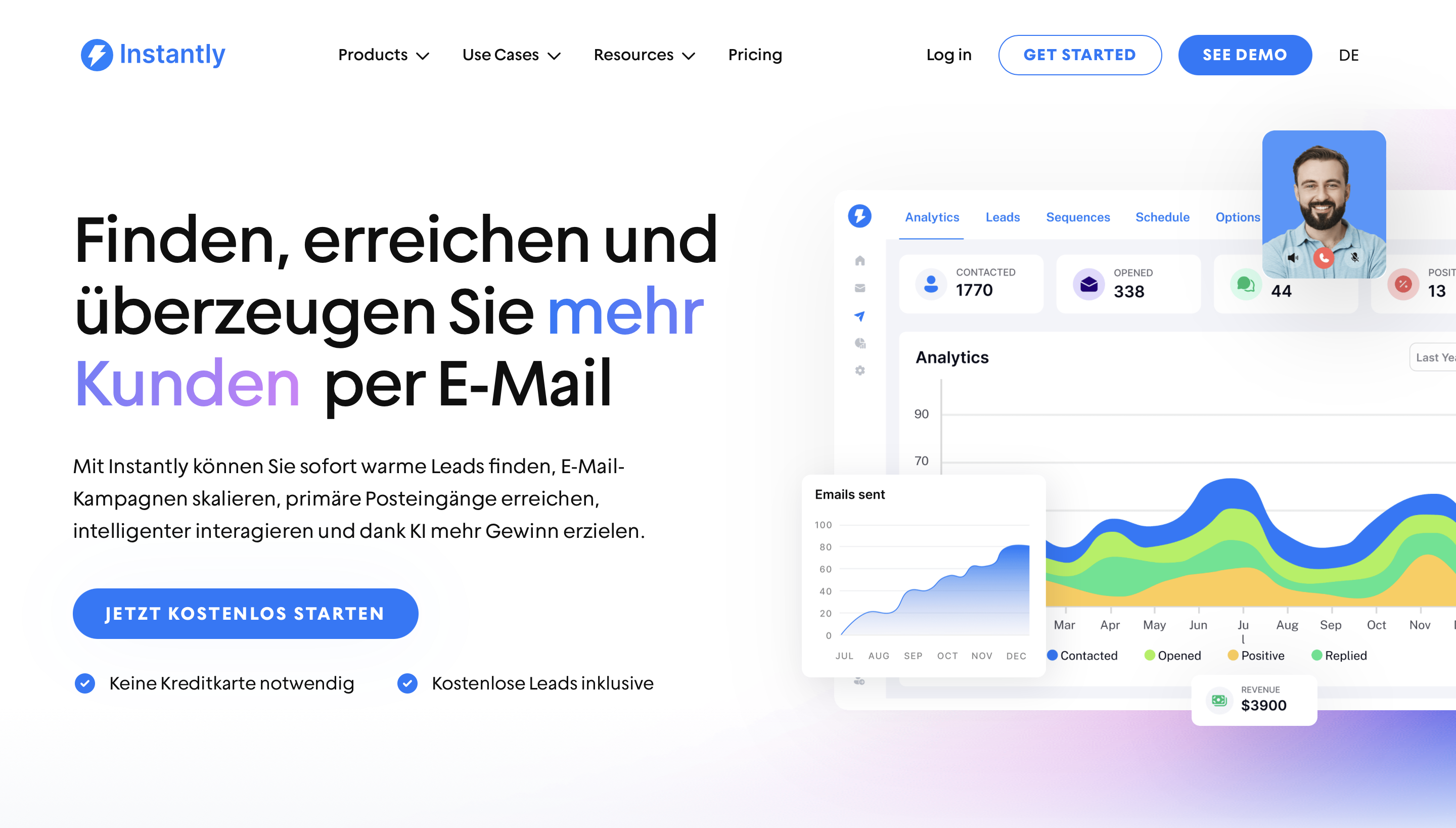
Instantly automates high-volume email outreach while maintaining deliverability and sender reputation through sophisticated infrastructure management. The platform enables aggressive scaling strategies without compromising email account safety or engagement rates.
Instantly's automation capabilities include email warm-up services, spam testing, and domain reputation monitoring that protect sender accounts automatically. Multi-account management enables high-volume sending while maintaining individual account health and inbox placement rates.
Campaign automation includes sequence building, response management, and performance tracking across multiple email accounts. Lead management features organize prospects and automate engagement tracking throughout outreach campaigns for optimized timing and follow-up coordination.
The platform excels for sales teams requiring high-volume email prospecting with emphasis on deliverability and account protection. Instantly's infrastructure supports aggressive automation strategies while maintaining technical compliance and sender reputation.
Pricing: Growth plan at $37/month; Hypergrowth at $97/month; Light Speed at $358/month.
12. Gong
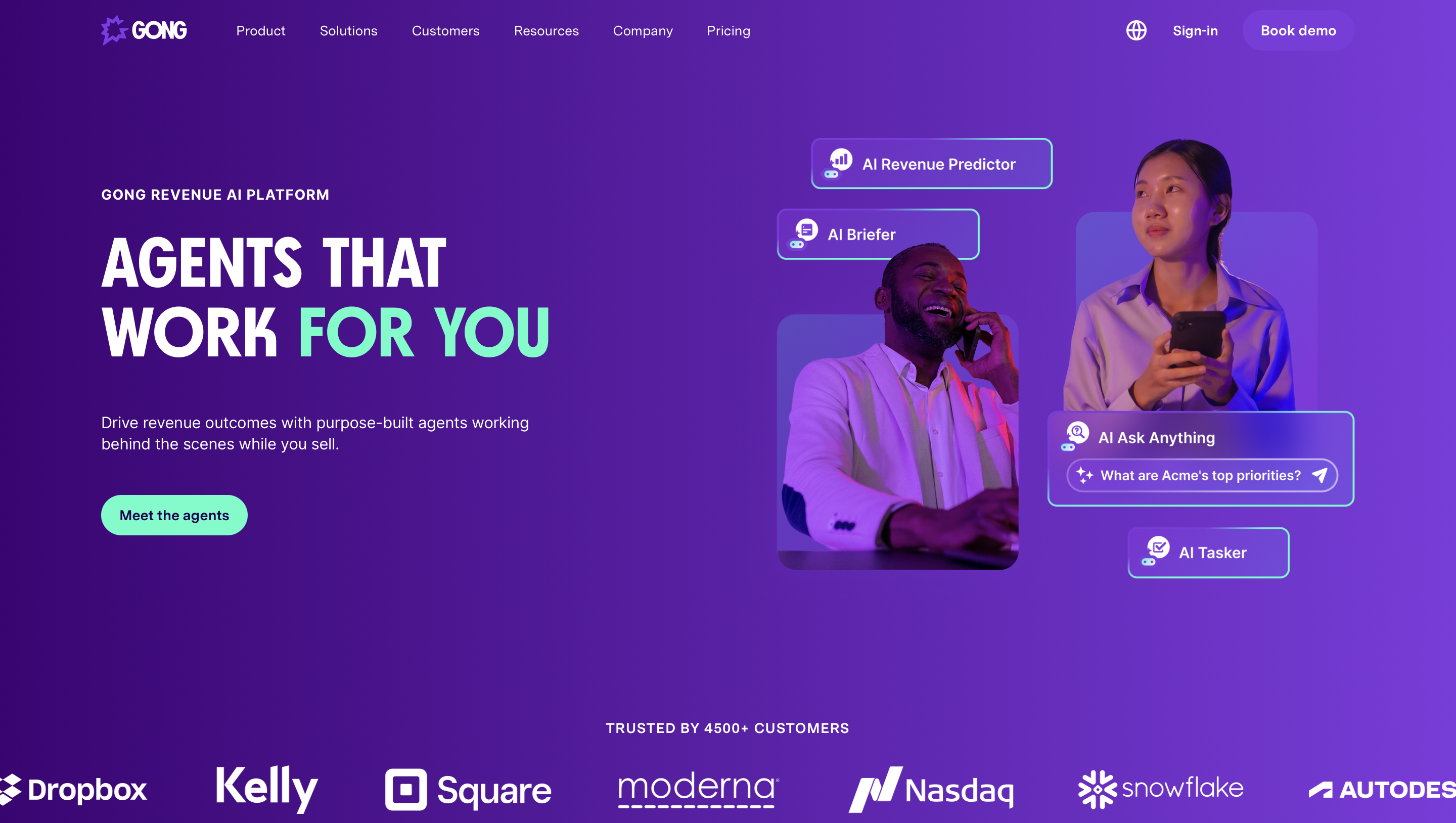
Gong automates sales conversation analysis and coaching through AI-powered call recording and analysis capabilities. The platform provides automated insights into prospect interactions, competitor mentions, and successful messaging patterns for performance optimization.
Gong's automation features include automatic call recording, conversation transcription, and AI analysis that identifies successful talking points, objection handling patterns, and deal progression indicators. Automated alerts notify managers when deals require attention or intervention.
Advanced analytics track conversation quality, competitor positioning, and team performance trends across all prospect interactions. Coaching automation provides personalized recommendations for individual sales professionals based on conversation analysis and successful peer approaches.
The platform works exceptionally well for teams with complex sales cycles where conversation quality directly impacts conversion rates. Gong's automation helps identify successful approaches while providing data-driven coaching for continuous improvement.
Pricing: Custom enterprise pricing based on team size and feature requirements.
13. Drift
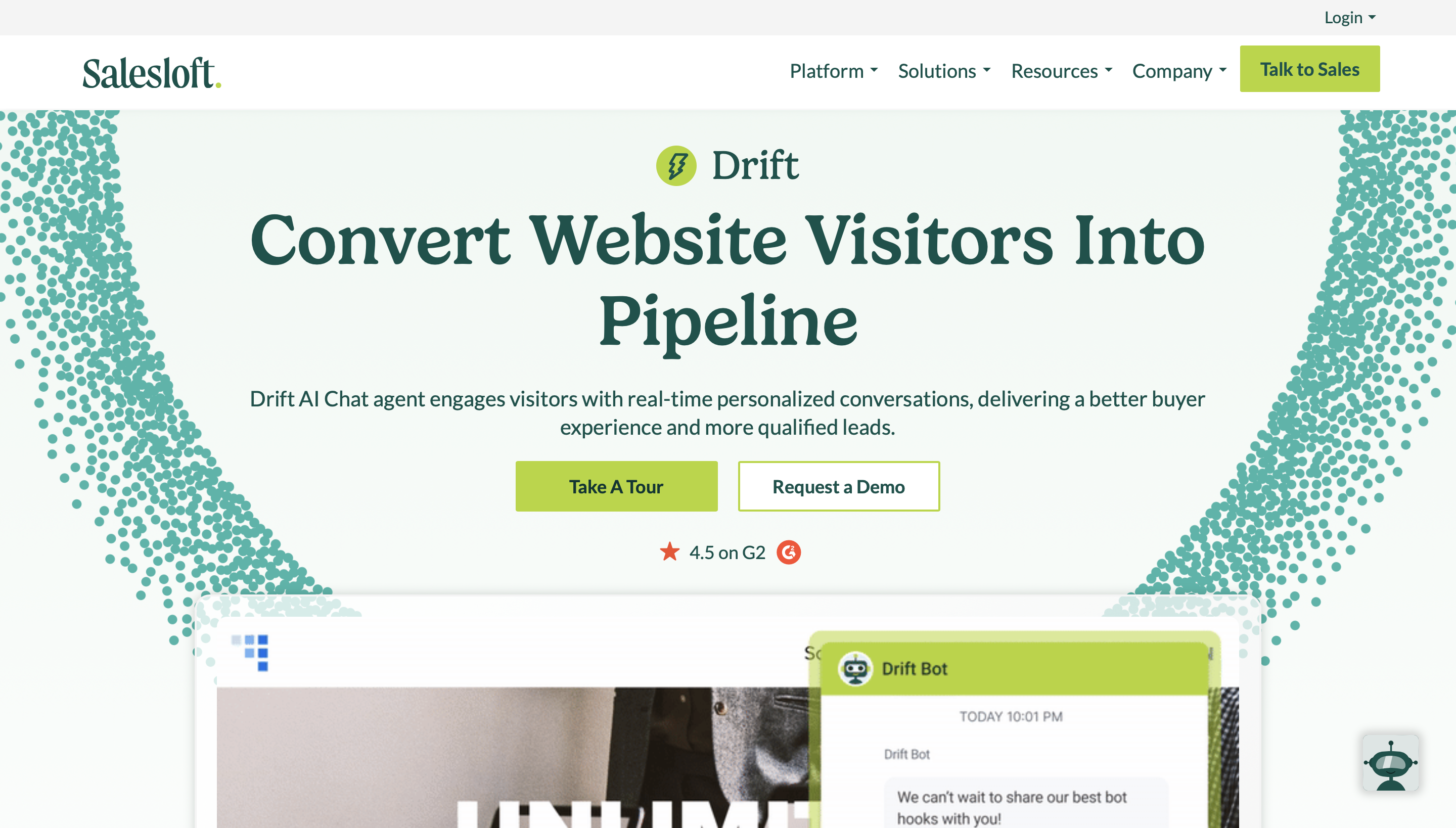
Drift automates website visitor engagement through AI-powered chatbots and real-time conversation capabilities. The platform captures and qualifies prospects instantly while they demonstrate buying interest through website activity.
Drift's automation features include intelligent chatbot conversations, lead qualification based on predefined criteria, and automated routing to appropriate sales representatives. Real-time alerts notify sales teams when high-value prospects engage while automated meeting scheduling eliminates coordination friction.
Advanced targeting capabilities display personalized messages based on visitor behavior, company characteristics, and previous interactions. Integration with CRM and sales engagement platforms ensures seamless lead handoff and follow-up coordination.
The platform excels for businesses with strong website traffic where immediate engagement creates competitive advantages. Drift's conversational approach appeals to modern buyers while automating initial qualification and scheduling processes.
Pricing: Premium starts at $2,500/month; Advanced and Enterprise require custom pricing discussions.
14. ActiveCampaign
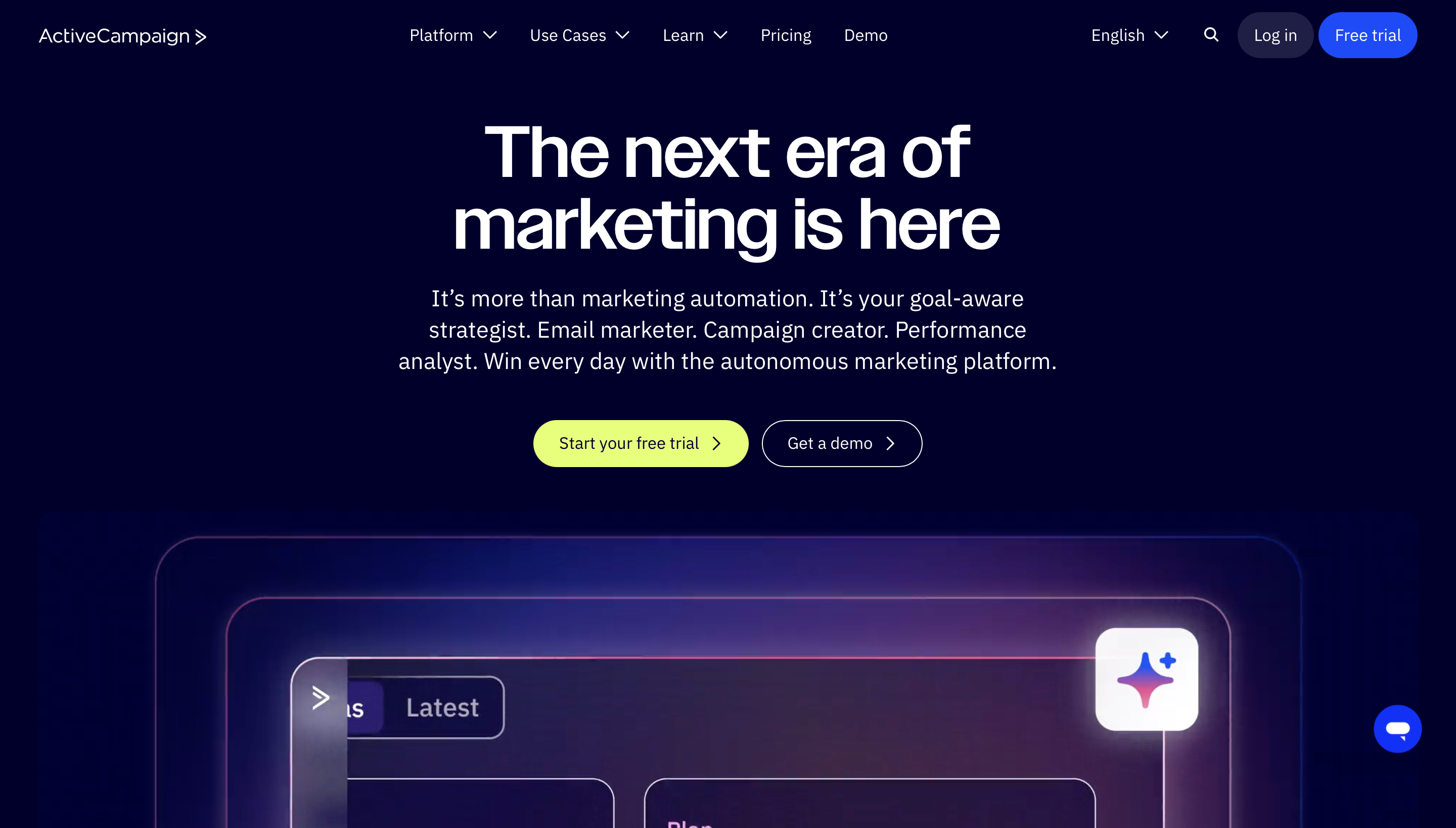
ActiveCampaign automates comprehensive marketing and sales workflows through behavioral trigger capabilities and customer journey mapping. The platform connects marketing activities with sales processes through unified automation and detailed performance tracking.
ActiveCampaign's automation features include complex workflow creation based on prospect behavior, dynamic content personalization, and lead scoring that prioritizes prospects for sales follow-up. CRM integration coordinates marketing automation with sales activities for seamless prospect progression.
Advanced segmentation capabilities ensure relevant messaging reaches appropriate prospects while automation ensures consistent engagement throughout extended sales cycles. Performance analytics track automation effectiveness and identify optimization opportunities across marketing and sales activities.
The platform works well for businesses with complex customer journeys requiring sophisticated nurture campaigns and behavioral trigger capabilities. ActiveCampaign's advanced features accommodate growing businesses with evolving automation requirements.
Pricing: Lite at $15/month; Plus at $70/month; Professional at $159/month; Enterprise requires custom pricing.
15. Zapier
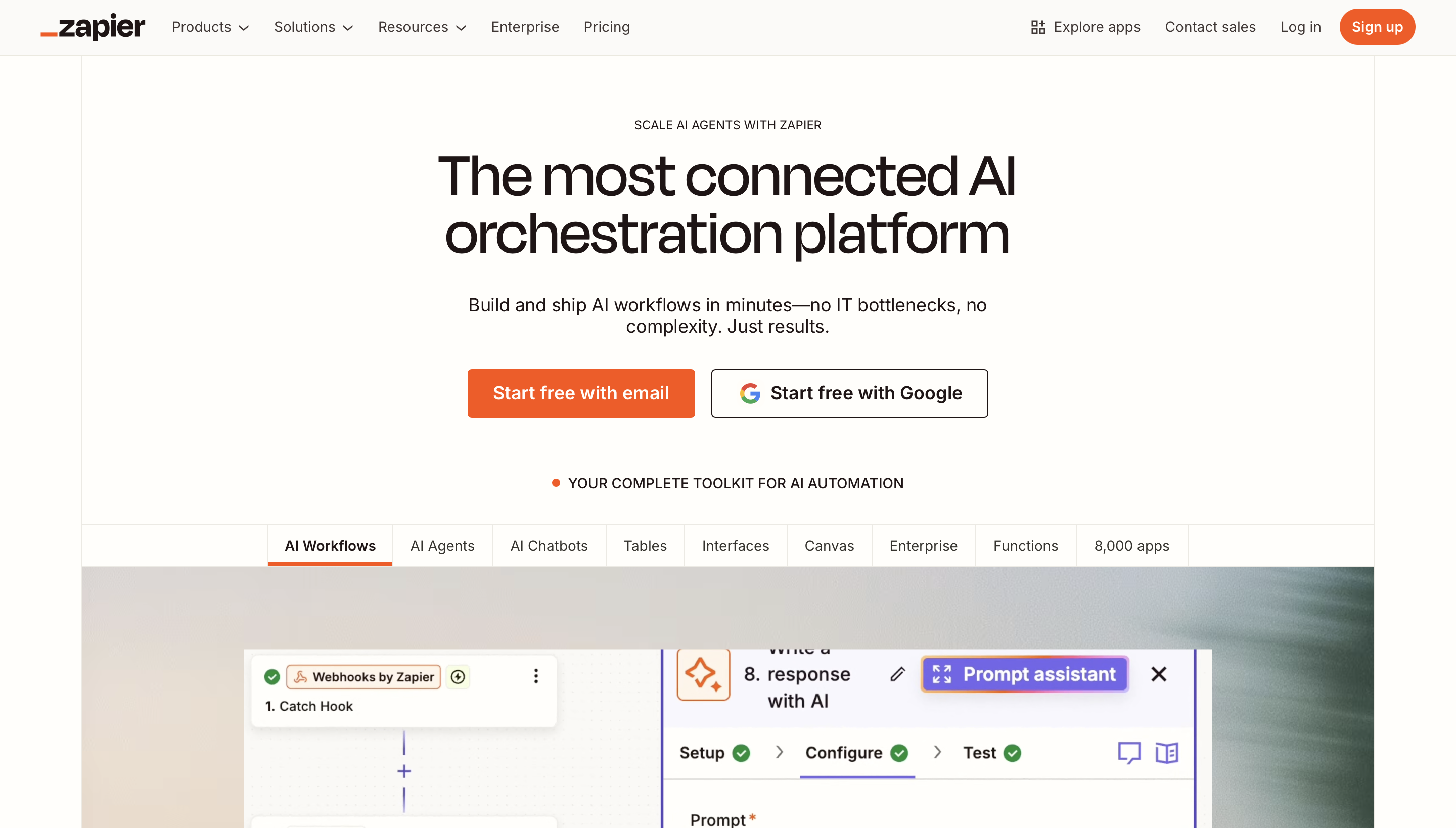
Zapier automates workflows between different sales and marketing tools through code-free integration capabilities. The platform connects thousands of applications to create custom automation scenarios that eliminate manual data transfer and repetitive tasks.
Zapier's automation capabilities include trigger-based actions, data formatting and transfer, and conditional logic that creates sophisticated workflow automation across multiple platforms. Template library provides pre-built automation scenarios for common sales processes and tool combinations.
Advanced features include multi-step workflows, delay timers, and filtering capabilities that create complex automation scenarios without programming requirements. Performance monitoring tracks automation reliability and identifies optimization opportunities.
The platform excels for organizations using multiple sales tools where data synchronization and workflow coordination require manual effort. Zapier's flexibility accommodates unique tool combinations while maintaining reliable automation performance.
Pricing: Free plan available; paid plans start at $19.99/month with increased automation limits and advanced features.
16. Chili Piper
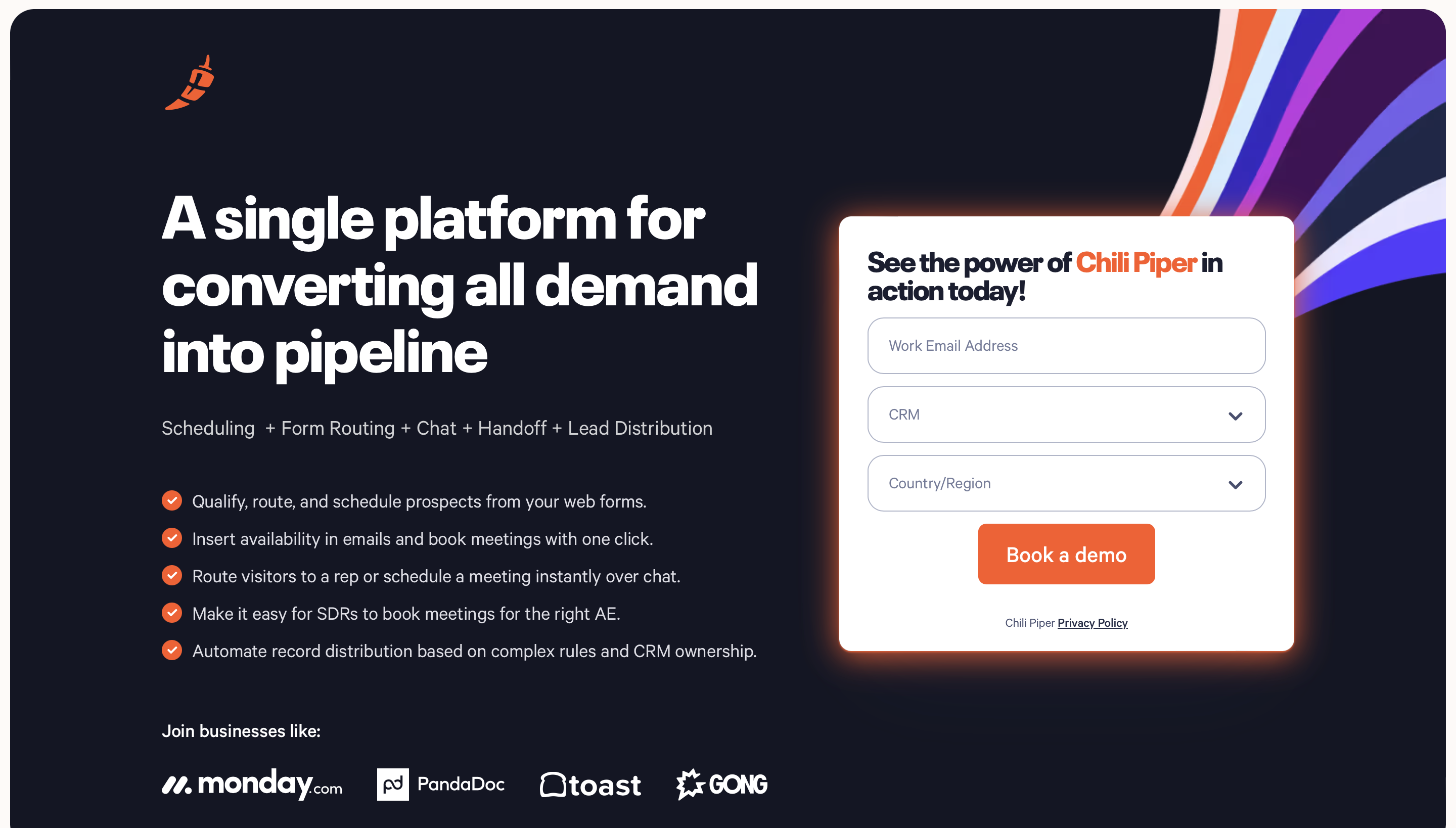
Chili Piper automates meeting scheduling and lead routing while optimizing conversion rates through intelligent prospect distribution and qualification workflows. The platform eliminates scheduling friction while ensuring qualified prospects reach appropriate sales representatives immediately.
Chili Piper's automation features include intelligent lead routing based on territory, expertise, and availability criteria, automated meeting scheduling with qualification requirements, and performance tracking across scheduling and conversion metrics.
Advanced capabilities include form abandonment recovery, meeting reschedule automation, and comprehensive analytics that track scheduling performance and identify optimization opportunities. Integration with popular CRM and marketing platforms ensures seamless workflow coordination.
The platform works particularly well for businesses with high inbound lead volumes where scheduling coordination and lead distribution impact conversion rates significantly. Chili Piper's automation optimizes both efficiency and prospect experience.
Pricing: Starting at $15/user/month; higher tiers provide advanced routing and analytics capabilities.
17. LinkedIn Sales Navigator

LinkedIn Sales Navigator automates social selling research and relationship building through advanced search capabilities and prospect monitoring. The platform provides automated insights into prospect activity, job changes, and company updates that create natural engagement opportunities.
Sales Navigator's automation features include saved search alerts, lead recommendations based on previous activity, and automated updates on prospect and company changes. InMail automation enables scheduled outreach while CRM integration synchronizes prospect information and interaction history.
Advanced search capabilities enable precise targeting based on multiple criteria while automation ensures consistent monitoring of prospect activity and engagement opportunities. Analytics track social selling performance and identify successful approaches for optimization.
The platform excels for consultative selling approaches where relationship building and industry expertise drive conversions. Sales Navigator's automation helps identify engagement opportunities while maintaining the personal touch essential for social selling success.
Pricing: Core plan at $79.99/month; Advanced at $134.99/month; Advanced Plus at $208.99/month.
18. Smartlead
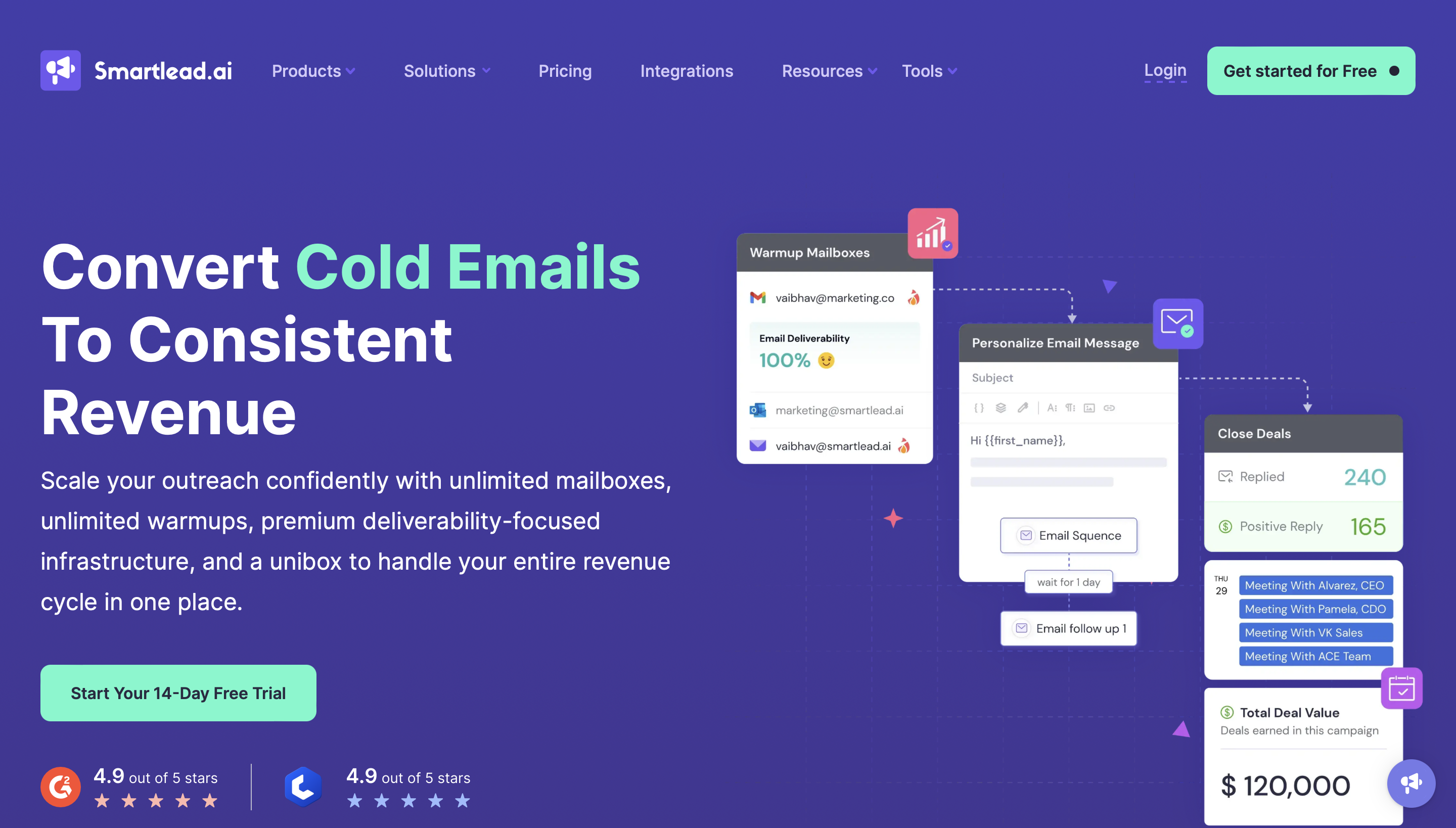
Smartlead automates high-volume email outreach through intelligent sending infrastructure and AI-powered personalization. The platform combines sophisticated deliverability management with advanced sequence automation to maximize response rates while protecting sender reputation.
Advanced automation includes:
- AI-powered email warm-up across multiple sending accounts automatically
- Dynamic personalization using prospect data and behavioral triggers
- Automated A/B testing for subject lines, sending times, and message content
- Multi-inbox management enabling scaled outreach without deliverability risks
Smartlead excels for sales teams requiring aggressive email prospecting with emphasis on maintaining high deliverability rates. The platform's AI continuously optimizes sending patterns, timing, and personalization to maximize engagement while avoiding spam filters and maintaining sender reputation across multiple email accounts.
The platform works particularly well for teams managing large prospect volumes where manual personalization is impossible but individual relevance remains critical for conversion success.
Best for: High-volume outbound teams requiring sophisticated email automation with deliverability protection.
Pricing: Starter at $39/month; Pro at $94/month; Custom enterprise plans available.
Implementation Strategies for Maximum Impact
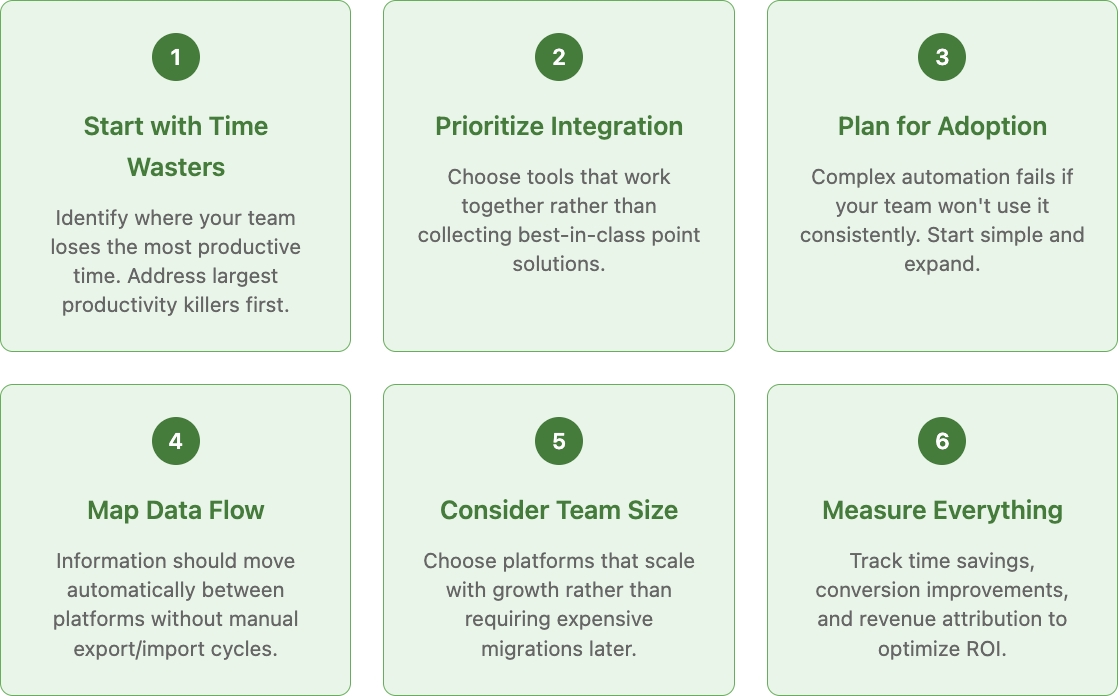
Successful sales automation tools implementation requires strategic planning, proper training, and systematic integration with existing sales processes. Organizations with structured implementation approaches achieve 70% faster time-to-value and higher adoption rates.
Begin with pilot programs involving small teams or specific use cases before organization-wide deployment. Progressive rollouts allow teams to master core functionality while identifying optimization opportunities and addressing technical challenges systematically.
Prioritize automation of highest-impact, lowest-risk activities first, such as data entry, email sequencing, and calendar management. Success with simple automation builds confidence and demonstrates value before implementing more complex workflow automation scenarios.
Invest in comprehensive training programs that cover platform capabilities, best practices, and integration workflows. Vendor-provided training should be supplemented with internal coaching and ongoing support during initial implementation phases to ensure proper utilization.
Establish measurement frameworks that track automation impact on productivity, conversion rates, and revenue outcomes. Regular performance reviews help refine strategies and identify additional automation opportunities for continuous improvement.
Integration Best Practices
Effective sales automation tools integration requires careful planning to maximize data quality, workflow efficiency, and user adoption. Organizations with well-integrated automation ecosystems achieve 45% better performance than those using disconnected tools.
Map existing sales processes before selecting automation tools to identify integration requirements and workflow dependencies. Understanding current processes helps select compatible tools and design integration strategies that enhance rather than disrupt established workflows.
Prioritize data quality and consistency across integrated platforms through standardized field mapping, duplicate prevention, and regular data cleansing procedures. Poor data quality undermines automation effectiveness and creates user frustration that reduces adoption rates.
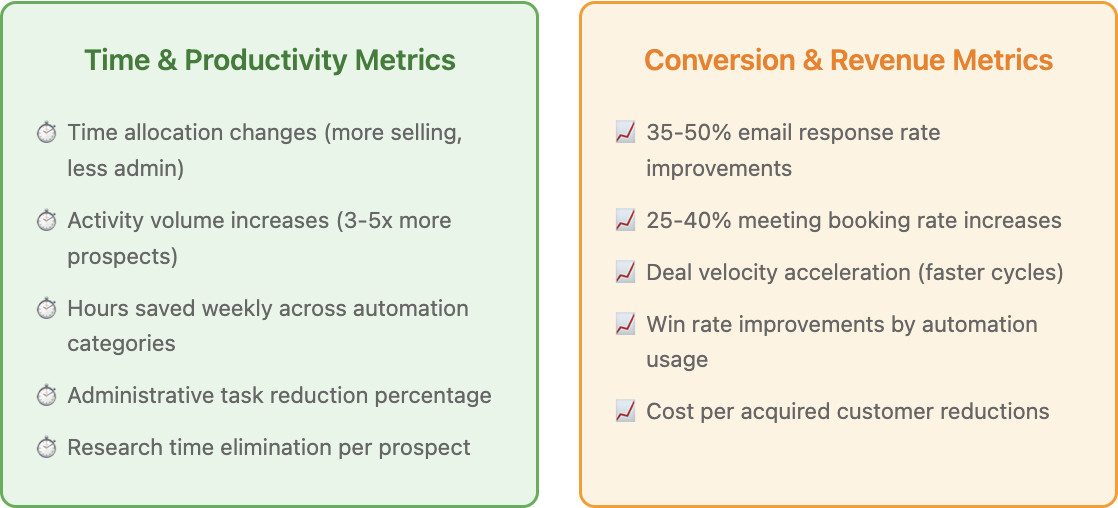
Implement gradual integration phases rather than attempting comprehensive automation simultaneously. Sequential integration allows teams to adapt to changes while identifying optimization opportunities and resolving technical challenges systematically.
Monitor integration performance through automated alerts, data quality reports, and user feedback mechanisms. Regular monitoring helps identify issues early while ensuring automation continues delivering expected benefits as business requirements evolve.
Sales Automation Maturity Levels
Organizations typically progress through three automation maturity stages.
- Level 1 involves basic task automation like email scheduling and calendar management.
- Level 2 introduces data integration and workflow coordination across multiple tools.
- Level 3 achieves intelligent automation with AI-driven research, predictive insights, and unified prospect intelligence - the level that separates market leaders from competitors.
Frequently Asked Questions
What are the most important sales automation tools for small businesses?
Small businesses achieve best results with cost-effective platforms like HubSpot's free CRM for basic automation, Calendly for meeting scheduling, and Databar.ai for lsit building and data enrichment. These options provide essential automation capabilities without enterprise-level investments while supporting business growth.
How much do professional sales automation tools typically cost?
Sales automation tools pricing varies significantly based on features and team size. Basic tools start around $15-50/user/month, while enterprise platforms can cost $100-300+ monthly. Consider total cost including setup, training, and integration expenses when evaluating automation investments.
What's the difference between sales automation and marketing automation tools?
Sales automation tools focus on direct prospect engagement, deal management, and revenue generation activities. Marketing automation tools emphasize lead nurturing, content delivery, and campaign management. Many modern platforms combine both capabilities for comprehensive revenue automation.
Related articles
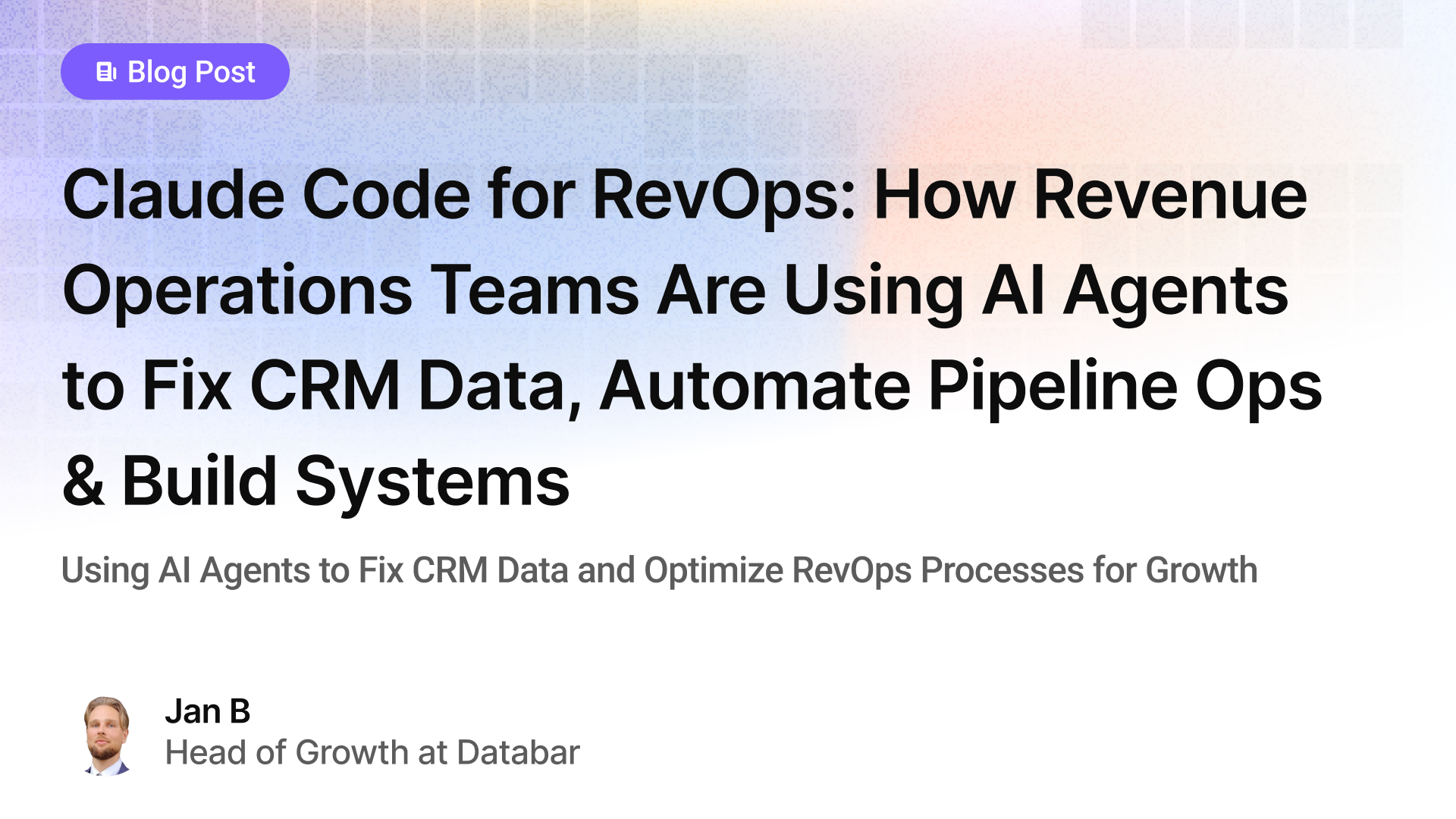
Claude Code for RevOps: How Revenue Operations Teams Are Using AI Agents to Fix CRM Data, Automate Pipeline Ops & Build Systems
Using AI Agents to Fix CRM Data and Streamline Revenue Operations for Scalable Growth
by Jan, February 24, 2026
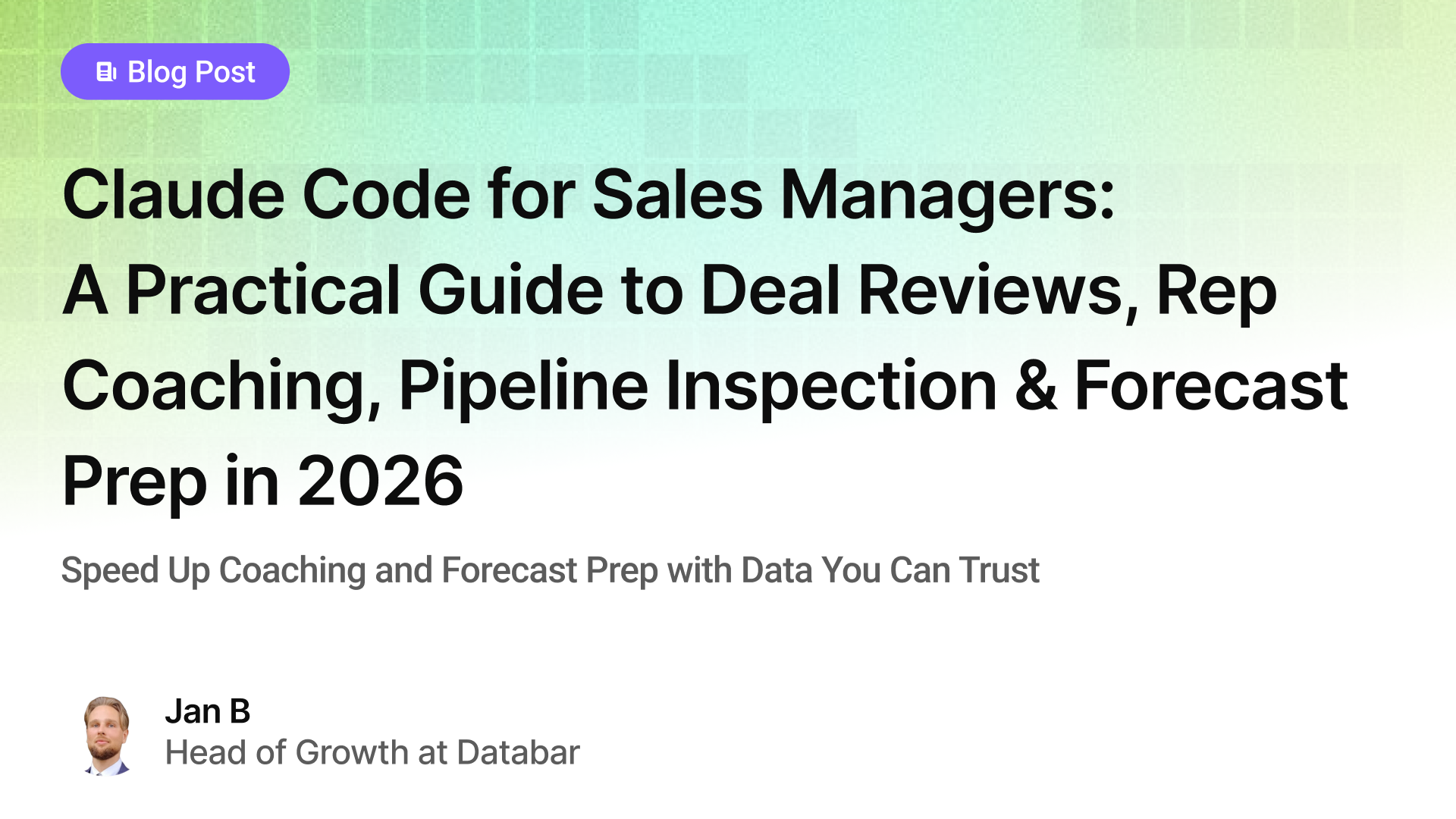
Claude Code for Sales Managers: A Practical Guide to Deal Reviews, Rep Coaching, Pipeline Inspection, and Forecast Prep in 2026
Speed Up Coaching and Forecast Prep with Data You Can Trust
by Jan, February 23, 2026
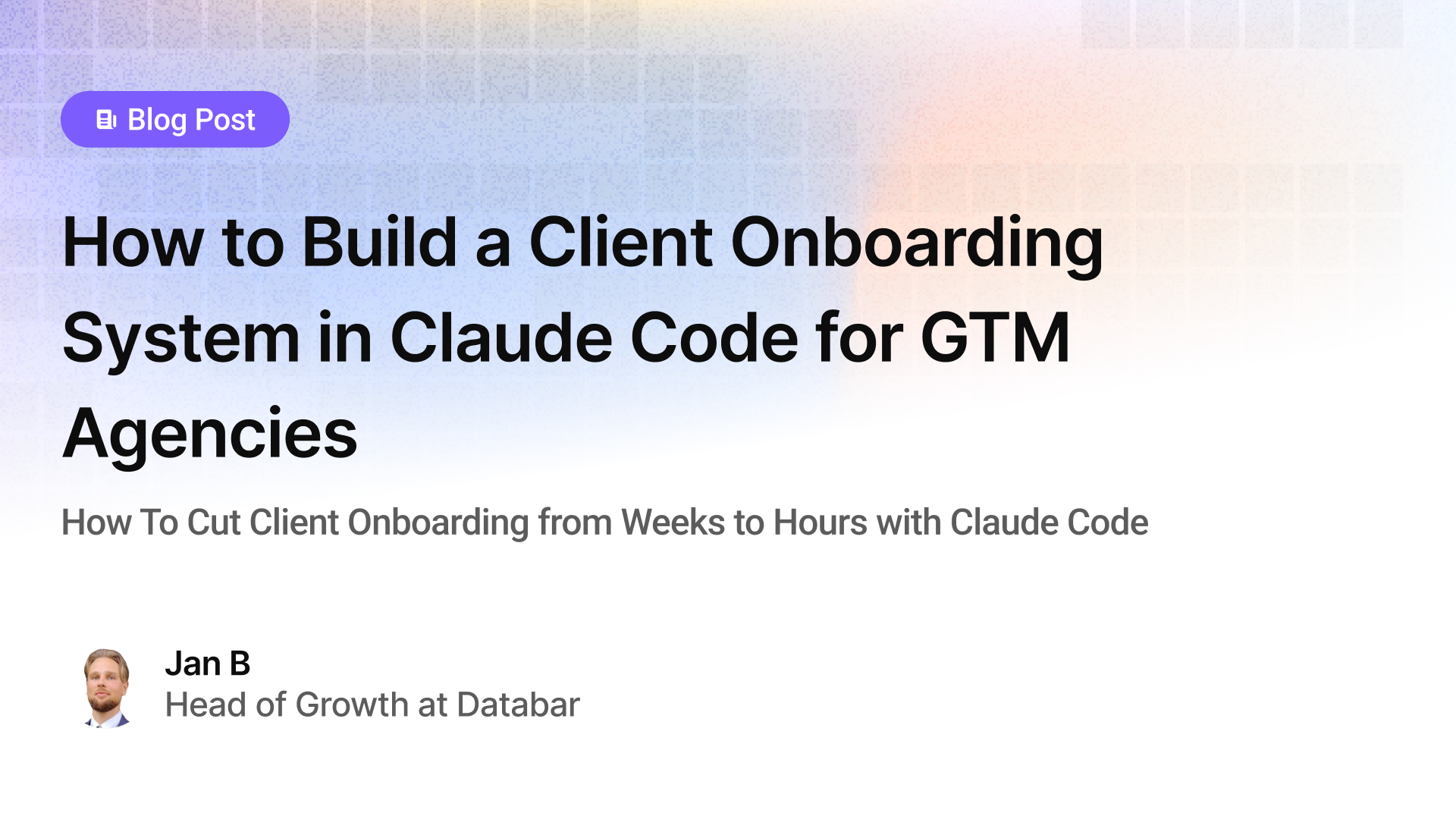
How to Build a Client Onboarding System in Claude Code for GTM Agencies
How To Cut Client Onboarding from Weeks to Hours with Claude Code
by Jan, February 22, 2026
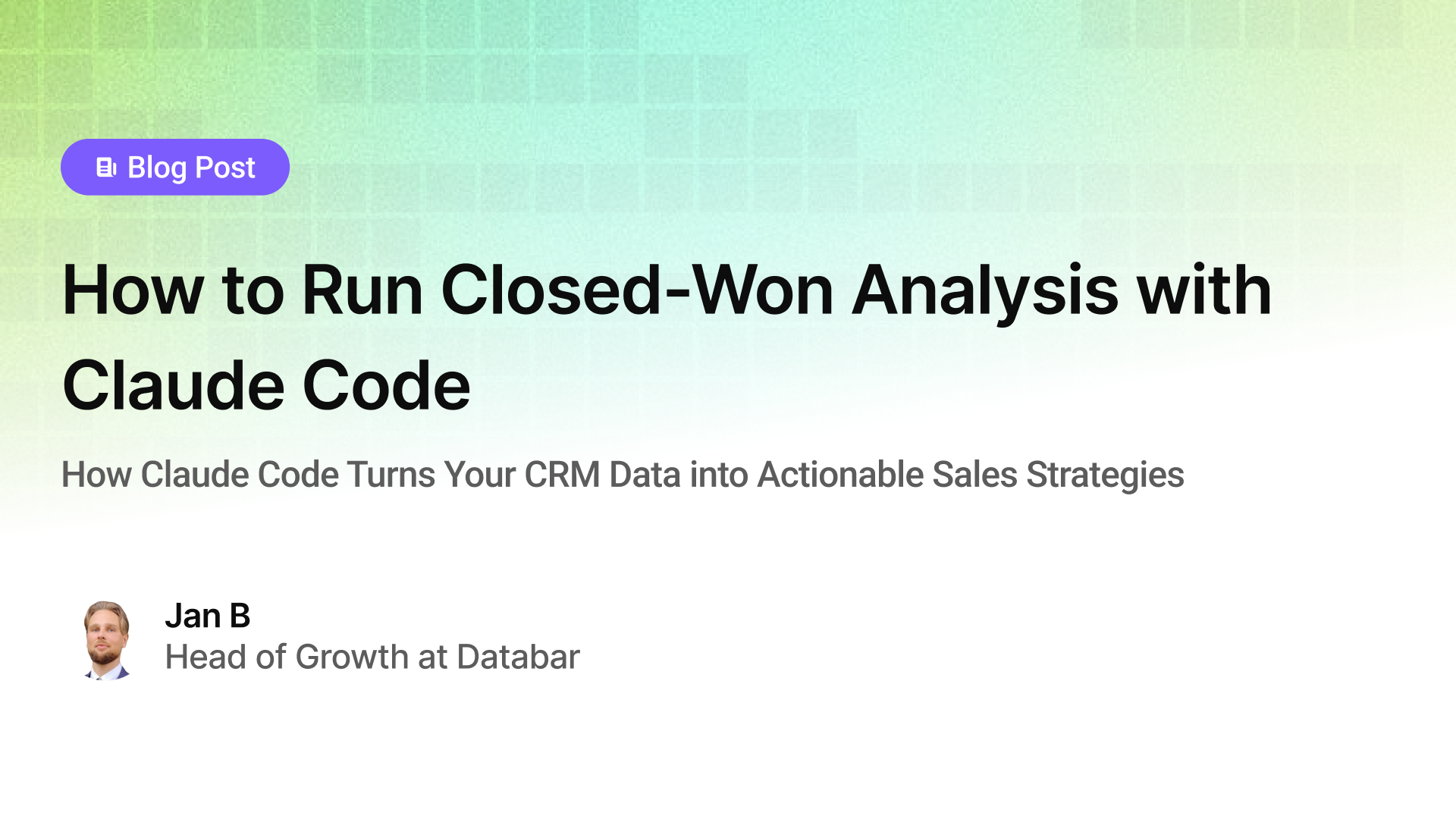
How to Run Closed-Won Analysis with Claude Code
How Claude Code Turns Your CRM Data into Actionable Sales Strategies
by Jan, February 21, 2026
